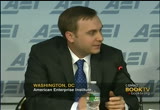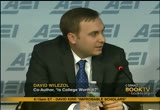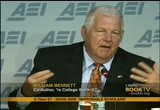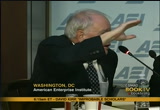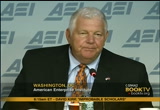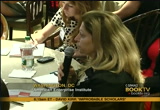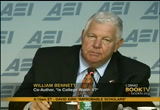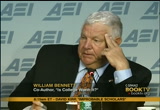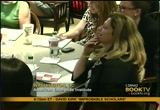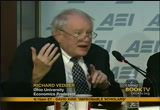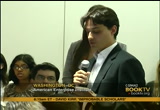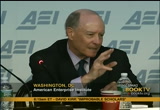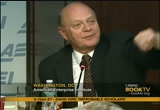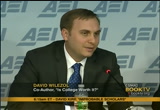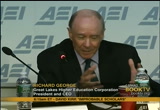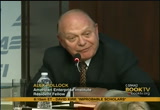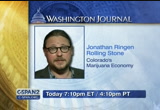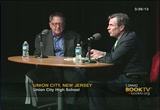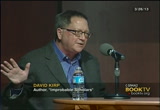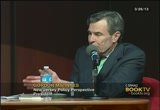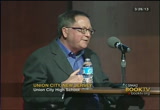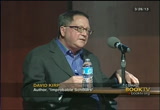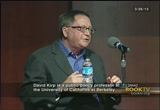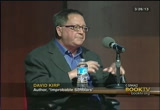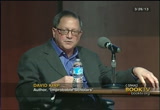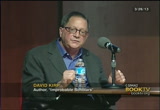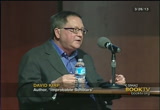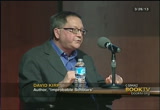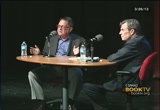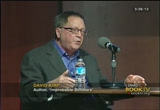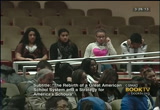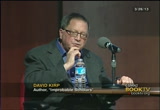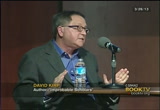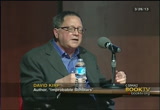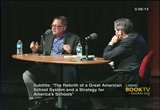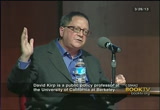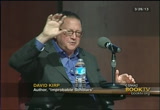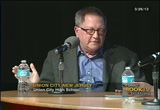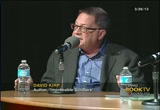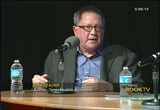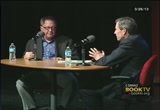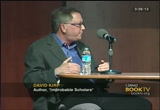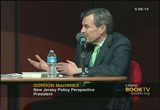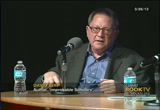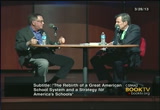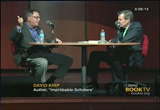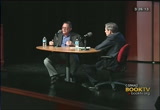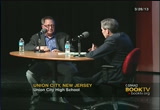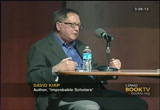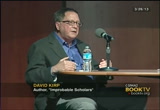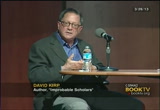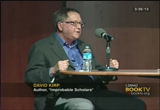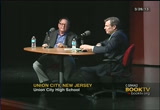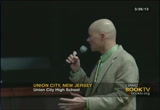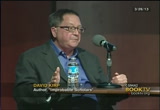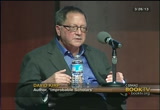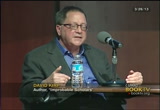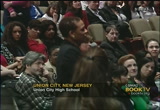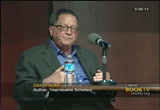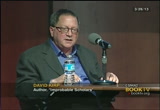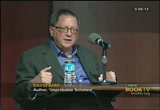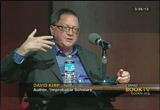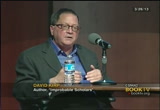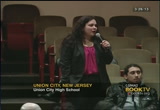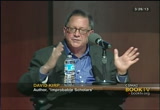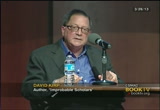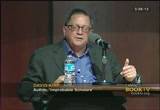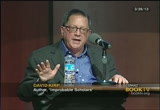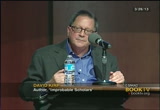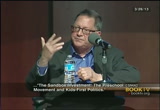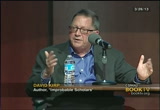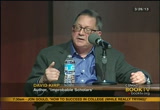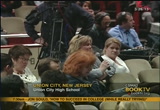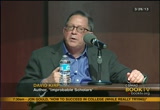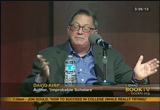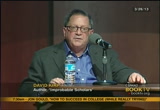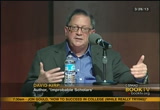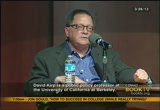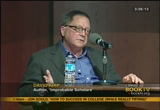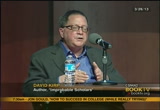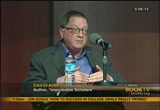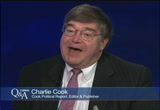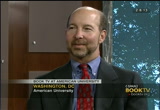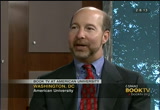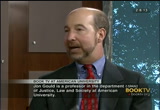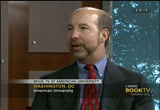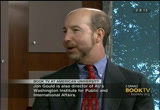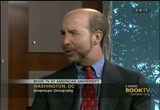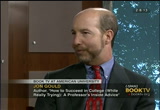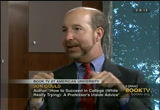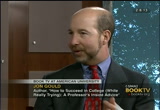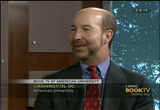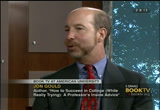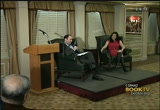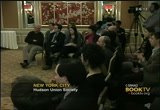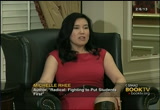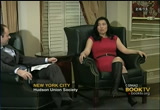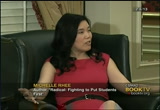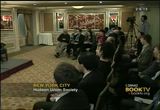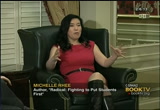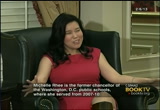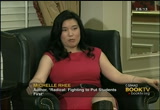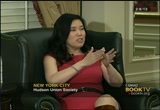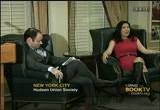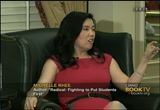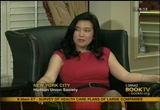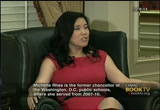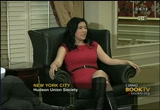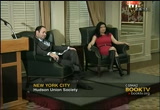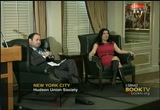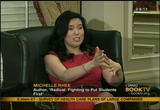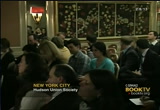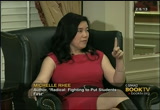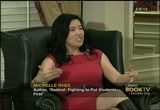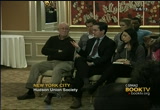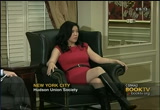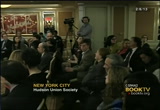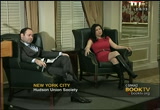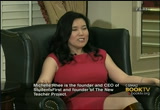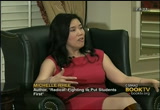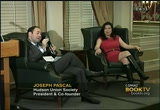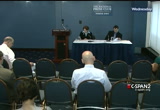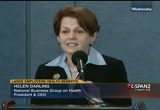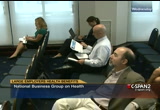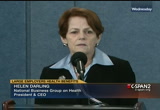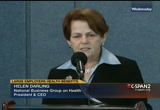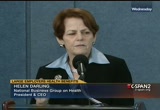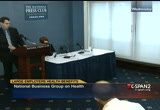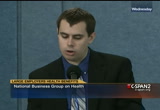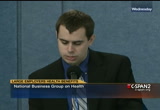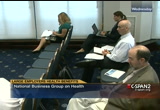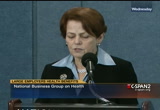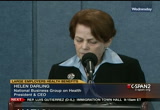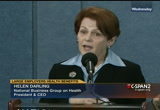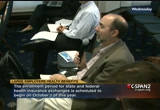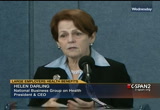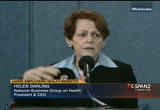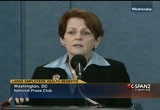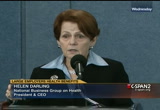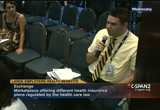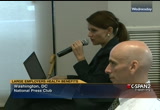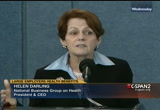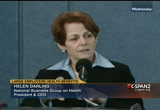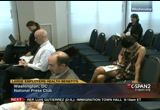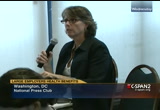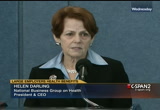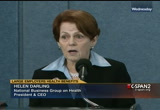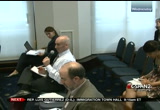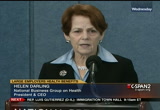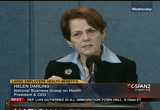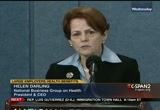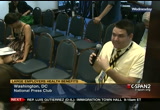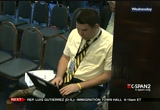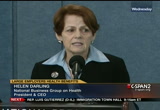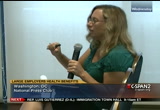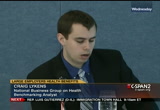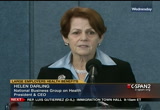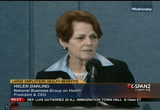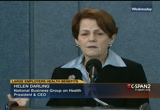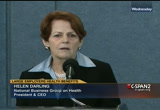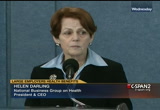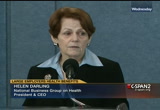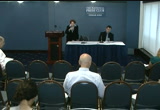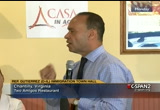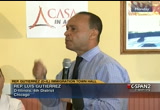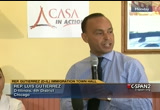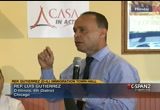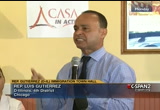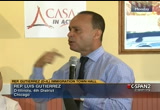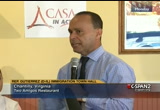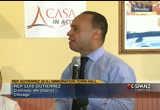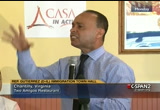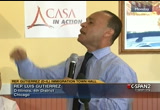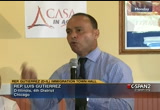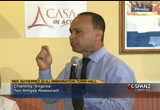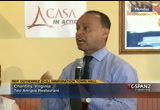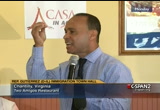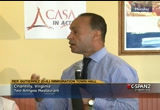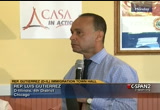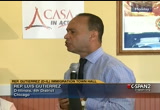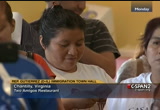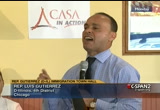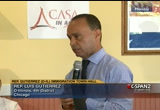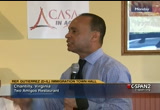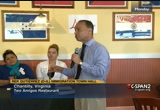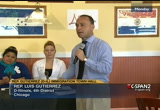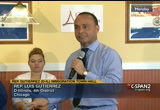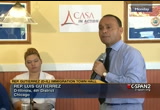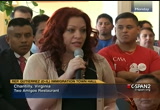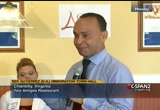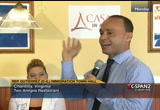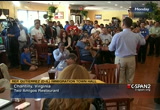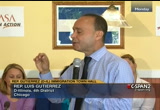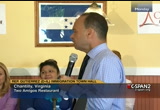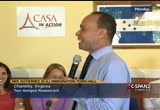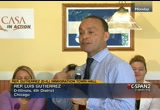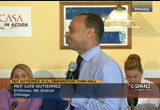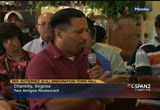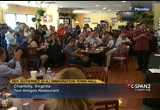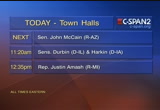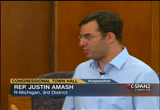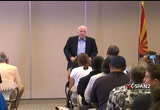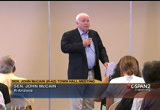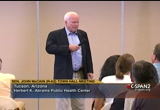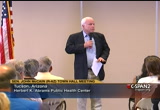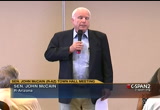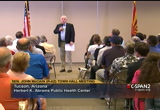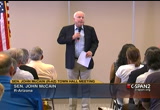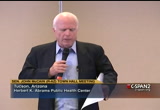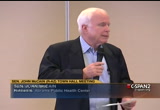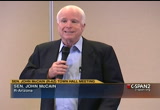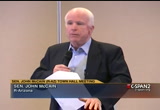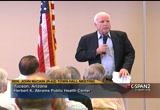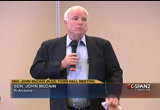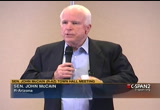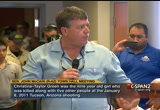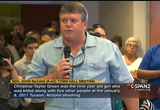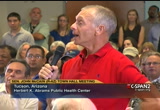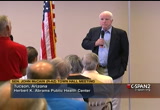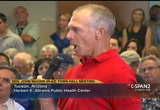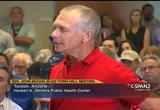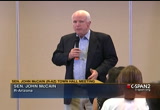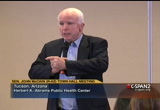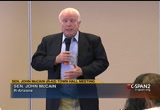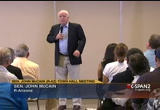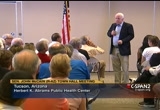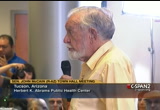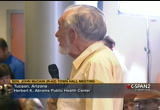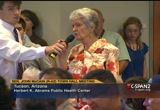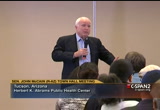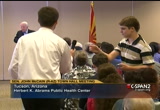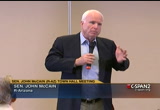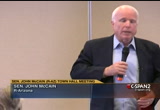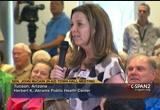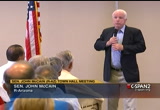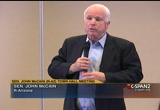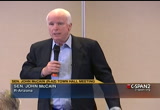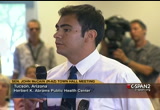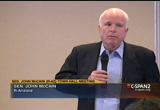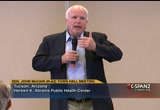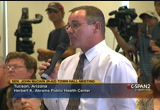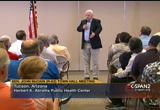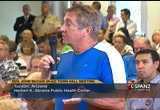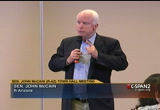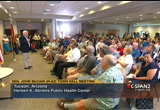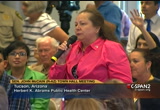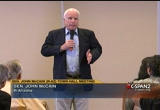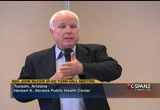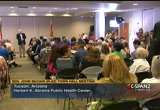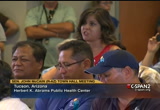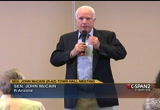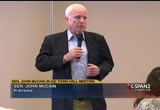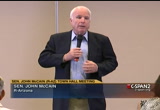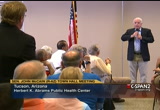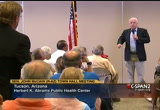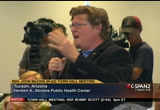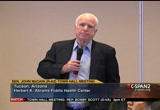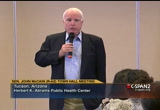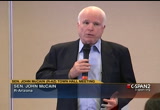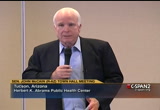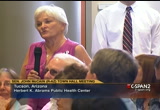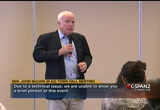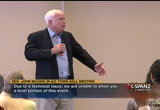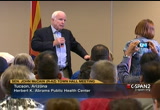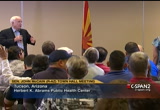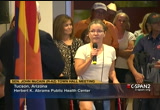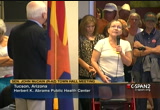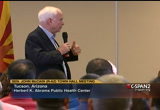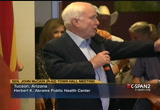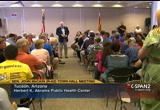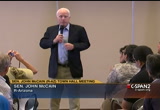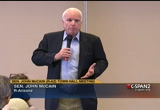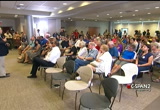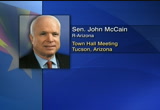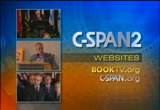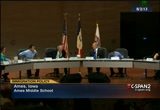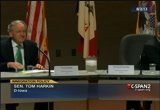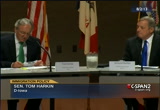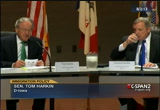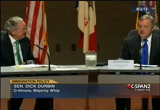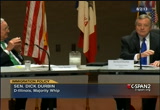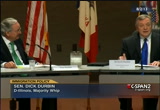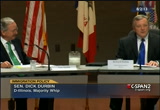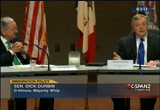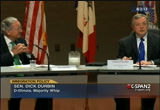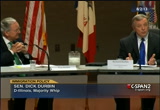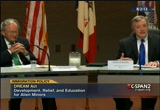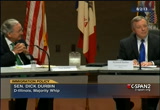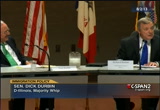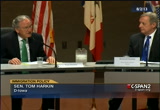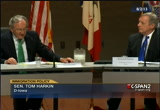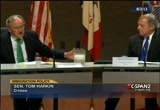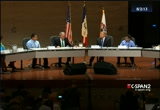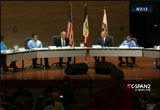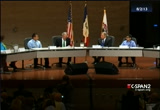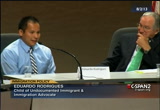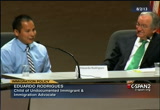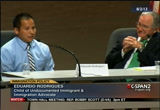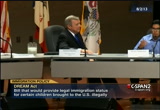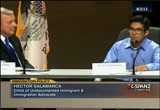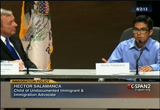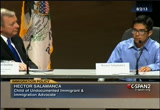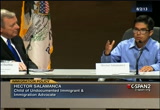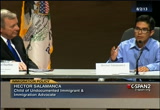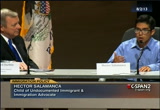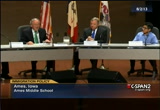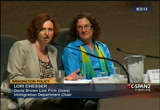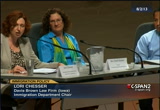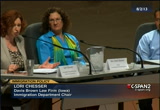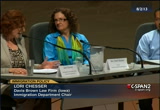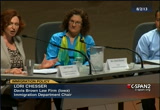tv Capitol Hill Hearings CSPAN August 30, 2013 6:00am-12:01pm EDT
6:00 am
>> i think that is one of the great financial calculations of becoming an entreprenentrepren eur. am i going to forego this experience to do that one? life is often the best teacher of those things and i think it's absolutely true when it comes to starting a business and building up a business and things like that. you look at steve jobs mark brook and bill gates. there was no value add it for them of college but i'm sure there are thousands of individuals across the country who has said the same thing about themselves and have the next big idea and it didn't pan out. so in one sense college absolutely might be a great fallback if your idea doesn't work out and you can be a computer program -- computer pro-grammar for google googler apple or whatever and have a great career. you may not be the next great silicon valley entrepreneur but
6:01 am
it's a financial calculation. the one thing we talked about in the book and i don't know how it is for many people but the founder of paypal scholarships he recruits the top students in the country like harvard doesn't he pays them to work with him and the other students. they get paid to go. they make a deal where teal and the company get a percentage of what these young people make as a result of this experience. it's investing in human capital and it's an interesting idea. one and it do to david wants me to tell quickly, after graduate school i went to law school harbor golf school. i lived in the dorm and it became known as the college proctor which is kind of funny. people were disaffected and wanting to leave college and i told them they were probably better off to stay.
6:02 am
one of my freshman graduated in medical school and became a proctor. he one of them was a entrench a tent and couldn't talk him into staying said john asked me to talk to this young man bill gates. i talked to him and talk to them and he just kept saying i have this thing i want to do and find the i in frustration told my friend let him go. [laughter] i thought of a good argument. if you are smart aren't you going to make the idea of better surrounded by a good faculty? this was something that i went to on my own. i said fine, good luck. you will never hear from me again. >> i don't know. someone in in the audience may have empirical evidence. it's a probabilistic world and there are risks associated with anything you do but i think there is a class for whom with
6:03 am
the entrepreneurial spirit and the entrepreneurial drive and basically high levels of cognitive abilities to begin with. that can thrive outside of the additional college environment. it's not for everyone and indeed i think it's for a few. most entrepreneurs don't succeed and it's a high-risk venture. >> it's probably choose that the aggregate of all entrepreneurial edgers are negative. bill, go ahead. >> the bell curve, not the book but the actual bell curve. jon stewart bell says any standard will work if any idiocy can be joined with it. genius the zuckerberg the gates of jobs it works anyway. madison didn't learn it all at princeton. madison just knew a lot and read
6:04 am
a lot here this book isn't written for those folks and arguably they some evidence or more i could tell from reading the jobs book and other profiles of successful people you should live in a ranch house in california and use your garage and play the guitar with the machines and you will make -- much more likely in college and statistically they may be true. but just kidding. >> hi i just wanted to thank you all for being here today and giving this presentation. i have a question for bill and by the way i also used -- two questions for bill bennett. you were talking about the liberal arts education and how it changed and i was curious to know how it had changed and how do you think this has impacted students in terms of their ability to get a job? my second question is you seem to in my opinion over and for size the economic benefits of an
6:05 am
education but underemphasized ability to think the which in my humble opinion is the primary reason for going to college. yes it's important to make a living and we all live in the real world and we have to make money but i think the ability to think critically would elevate our society to a different level. my second question is for richard. >> of the questions you get for the moment. >> i just want to ask one other panelists. >> just weighed in i will come back to you. >> very quickly it has been so debased and narrowband professionalized and deconstructed. we have the sense that we were studying shakespeare and the
6:06 am
philosophers that we are engaged in critical thinking that we were learning to think big about big questions and our thinking about these things would help us in the world. we were not thinking that we could make up any text that we wanted, that we were engaged in this great socratic enterprise about life. you entered into a dialogue. he didn't just too fancy intellectual footwork paid he left the dialogue. if i ran a college and wouldn't let people major in anything they wanted great if was my college i would say you have to pass through certain things in there are certain books that you have to read if you're going to be an educated person because i believe in not that then i wouldn't have a catalog that says you can do it anyway you want an major in anything you want. you can borrow as much money as you want because that would be a lie. the second part was? >> the second part was emphasizing the economic and if
6:07 am
it's over critical thinking. >> look, as richard commented you know we said in the book this is what the customers say they want trade you may wish to run a college if you go to st. johns college and say fine but you are going to read all the great looks. too bad. that's the way we do it but 88% of the students this is their number one priority and you present here so than say we will get you there and then get them there or be more truthful about it. >> now you have a fast question for richard. >> the last question for richard vedder. i'm just curious why do you think that women's studies broke rams don't have value? >> i knew i was going to get in trouble with that one. i didn't say they didn't have value. i said that people graduating in
6:08 am
women's studies and bill and david in that hook have empirical evidence from pay scale.com that says women's studies graduates and gender studies graduates latin american studies graduates don't on balance are in a lot of money. that doesn't mean they have no value. there is both a consumption and an investment value to higher education. you can go to college for as many years as you want and take courses. i studied french literature for a year in france. it has done me utterly no good location only but i'm glad i did it. if you want to major in women's studies, a fine but there is a public policy issue of two women's studies graduates who are in women's studies are they thinking they will earn money and there may be even a public policy issue that policymakers want to discuss on how much public subsidy should be make on
6:09 am
private consumption of people whether it be women's studies or basketball or anything else. why should the government be paying for people to live their consumption rate when they don't do it for a six pack or a bucket , could the guy who has a lunch bucket that works in the steel mill. we don't do anything for him and why should we do it for the college yuppies? >> do we have another question? wait for the microphone please. >> my name is adrian and i'm a ceo and founder of an on line program for high school and college students and i'm also an entrepreneur and a stanford grad i wrote down my question. knowing colleges are slow to adapt but students will still likely go to college at least in the near future what is in your opinion the best way to maximize
6:10 am
their return on the college investment and whether students need to take a very different approach to college than their parents in terms of focusing around practical skill acquisition and job placement in what is the role of career prep at the high school level to allow students to be more empowered in figuring out a way of aligning the general education system towards those and career goals? >> i want to give dick george a. chance to tackle this question. >> one of the things the book ends with is the impact technology will have on the transformation academy and i think clearly if you can fix accreditation which is as broken as the financial aid system itself, we could move much more rapidly and most of you are probably familiar with badges. i think a competency -- competency-based education we are going to seep edges that are
6:11 am
developed to assess competencies in multiple fields of endeavor including entrepreneurial skills and if you can imagine a badge that is awarded by a consortium silicon valley companies recognizing entrepreneurial skills that adage may be worth far more than a computer science degree or an mba. i think as we can more rapidly move into competency-based education and a four year based designation of skill sets for badges that will be one of the most important things in the technological transformation of the academy going forward. >> that's not unlike an old-fashioned apprenticeship program which is talked about. i want to take more question. i want to go way to the back. we have given the people in the front an unfair advantage. >> jerry meyer of st. johns university. st. johns college.
6:12 am
this is a different one. yeah basketbalbasketbal l. we talk a lot about outstanding student loan debt. what do you think should be done because you really cannot discharge this under any circumstances. these deaths are ultimately paid for by the taxpayer so is it unjust to forget that but then how does that stand in the strong tradition of bankruptcy we have in this country? what do do we do with the death of tardy off there? >> it's unjust to forget it and that sounds kind of horrible but this was a private decision made when someone decided to take advantage of the public subsidy. it was a calculated investment that hasn't worked out so well. now, what can someone do who finds himself many thousand of dollars in debt and doesn't want to be there? there is still more education. on the one hand that is how people get even even more in foreign debt and get themselves
6:13 am
in bad places but if you are a sociology major $60,000 in debt and decide you don't really want to be there there's the colorado school of mines for you. go get a degree in mineral or petroleum engineering and get out there in north dakota where the average salary has increased by 40% since 2009 because of the oil and natural gas boom out there. i think it's a tough question. i don't think we should be in the business of forgiving student loan debt. there is a personal responsibility element there that is orthodox. >> i agree with david it's a matter of public policy but unfortunately we are the owner. we have public service loan forgiveness and we have teacher loan forgiveness. we have a myriad of loan forgiveness broke rams already and anybody else that is struggling with debt is potentially eligible for income-based repayment which at
6:14 am
the end we forgive the debt. i think the unfortunate answer is we have built-in alternatives to a critique if you charge and that's simply a reality and talks of those forgiveness programs that are cycled back and paid for by the other participants in the program. >> i think a really important message of the book end of this discussion is made clear and truthful about what we are doing. with simple truths like the two-thirds of the people are having post-secondary education and it cannot be that all of them will make over the median income. that is math and get what you hear every time you read some popular article you will make more money than half the people at least if you get an education. we have to be precisely honest
6:15 am
about what we are doing and about what is consumption and what is investment and what are like investments to be and what does it really mean to be in debt dischargeable or not? i think this book is a really strong set of steps forward in getting more clear-eyed with ourselves as a society but what's going on here. as was this discussits.
6:18 am
>> creation and eventually wind down the court decisions, and it's clear i'm not an educator, and i didn't know what to do, but, fortunately, i spent time in union city, and i had discovered that even though this is hudson county, even though this is -- that this was a story that needed to be told, and i used union city as the example for the other districts, and thank god for union city otherwise i wouldn't have known what to do otherwise. david and i had here tonight to talk about this very important book. it is very important to union city, but this is a book important for the whole country, and in talking about it, i want
6:19 am
to start with a pizza party, a pizza party that took place today in washington school; is that right? >> that's right. >> we have the scholar awe thoor from california who came to union city to throw a pizza party, and i'd like the scholar author to explain himself. david? >> i was lucky enough to spend a year here in new jersey, a transformative experience for me. a lot of the time, i was in washington. when i was told i was going to be in washington elementary school and spread the news with the architects of the transformation, he said, god, union city is confident. it's one of the elite schools, and i spent a lot of time in room 210 in ms. molly's 3rd
6:20 am
grade classroom with kids -- [applause] , and, aleah, would you stand up? that was where i was mr. david to the kids. i'm sure -- 8th graders -- 8-year-olds are passionate folks. i was mobbed so much that we would work, okay, table one, you mob mr. david, and table two, go mob mr. david, and a pizza party was a tradition, and so today, you know, i was doing a public tv show, and i'm here tonight with, in a lot of ways, the best part of the day was the pizza party i threw for the kids are now 5th graders, and who i'll stick around for a while. the story i tell in the book starts there, and it works up the ladder, and it starts there
6:21 am
because the very heart of what any good school system has to do is connect talented teachers, engage students in a challenging curriculum. that's the nub. everything else builds out from there. that's why i was there. it's where the emotional bond was formed, but, as you know, i roam far and wide beyond that school, andive the pleasure of writing about it in this book. >> so, this is a very stubborn topic in american life. it's been something that is why aren't we doing a better job of educating kids from poor families when they go to school with other kids from poor families? we talked about this for a half century. there's been thousands of books
6:22 am
written about it, scores of commissions formed to analyze and report on it, and there have been as sandy mentioned, lots of silver bullets proposed, and teachers and principles, and city school districts, there's a new fad every 18 months that comes from washington or trenton saying this is an answer. this seems to be the work and practice and octoberives nobody can argue with. why is it worth the book to point out it's platitudes. >> i thought about calling it, "tortoise beats hear" because it's telling a story not told in a long time.
6:23 am
if you -- it's about magic bullets, and the schools, no account teachers, and let's bring in teach for america clubs, open up charter schools in the district, and that's the model, the idea that's been propagated for the last decade plus under republican administration and a democratic administration. it is just the latest in a series of silver bullets overredded up, and you can just change the structure and everything else changes, but i think what union city teaches is -- or reminds us that -- is that there are a handful of
6:24 am
time-tested, well-proven, well-established game changing strategies the school district can be done, and i'll say a word about that in a minute. why write about it? people forgot or took it for granted. it is almost like platitude, and any incompetenter with -- educator with a pulse will nod their head and say, sure. the trick is actually going from saying, yeah, that's a great idea to making it happen. in union city, you start with amazing preschool systems, and i know you are here someplace or another. where are you, suzie? [applause] i spent a fair amount of time in your class, and i walked in there, and i thought, why am i not three years old?
6:25 am
this is so much -- this is so cool. i mean, anything, any kid, whatever age, might want to do is there, and i watched a lesson, last time i was there, a lesson, and for those of you where it's not a familiar word, it's potato pancakes, and it's a hanukkah tradition, a jewish hanukkah tradition, and the kids read a story about an old lady who is making them, it's a great story, to prep themselves for this, but the lesson was these kids, these three and four year olds will make them on a real honest to god stove, but every aspect of that lesson, you know, from the picking up of the potato to smelling the potato, did they like it, the onion, what did it feel like, change when you cook? a big spoon, that's a tablespoon, that little spoon is a teaspoon.
6:26 am
everybody had a hand chopping the vegetables, chopping the onions, and the "p" sound in piment torks s is the same "p" sound in pepper. what do you think happens when we put this in a food processer? let's find out. they are teachers. i spent most of the time teaching, dreaming of teachable moment, and every sect of that lesson is a teachable moment, and i came back, roamed around visiting other classrooms, and they were ready, diewcht to try them? i said sure, i took the plate, and i grabbed it, and sour cream and apple sauce, traditional things that you serve so what do you think was also served with these?
6:27 am
salsa, and let me tell you, salsa improves them. [laughter] i'm giving up on apple sauce and substituting salsa. when people focus on systems, politics, focused on adult games, they their power play games, and i don't know if you know this, but in los angeles there's a school board election, thank goodness, by the way, there's not elections here so you don't have to go through that and $4 # million was spent to defeat one candidate who was questioning the endless growth of charter schools and wondered if they should be evaluated on the basis of students' test scores. in a world where that adult game playing where theids are forgotten is what the conversation looks like, where people talk about the market as
6:28 am
a model as though selling education is like, you know, selling ipads, it's an old and neglected story that needs to be revived, and one other thing, it's a celebration of yinon city, but not just union city that did so well, but i looked around the other country in other districts no one knows about, and we hear of aldean, texas? aldean is houston's poor cousin. scrubby country, about as poor as union city, latino, african-american, spattering of white folks, and with half as much money union city spends on its kids, they are doing well, narrowing the achievement gap, and what are they doing? very much the same kinds of things union city is, and what
6:29 am
is that? start with preschool, work up the curriculum. if there's a lot of kids from other countries, you better have a good bilingual program, a rich bilingual program that pays attention to language fluency and how they do in academic subjects. today it's bilingual, tomorrow english only, that happens in so many districts, especially in california. there's esl classes, day one. here kids transition slowly. this school district knows what educators know. that is it's really important to get a grounding in your home language before learning the second language. really important to hold on to that home language because being bilingual in the society is a huge advantage. a lot of the kids in union city come from homes where there are
6:30 am
not a lot of books around, where the parents are working all the time, and they make the meals, take care of the kids, but they don't have time to read to them. there's not a whole lot of rich language, so soak them in words, great stuff to read, lots and lots of writing, all sorts of writing. you want to get kids beyond the mad, bad, sad, glad vocabularies, all the rich words they have? in other places, the teachers in the audience, administrators know well, teachers are basically a punching bag. that's a sad, i think, immoral story that teachers are used for short term political gain. i think it does a great
6:31 am
disservice here there are assessments of students to serve two purposes, pin point where kids have problems. you know just where student needs to be helped. they pinpoint where teachers who are struggle have problems, and so they provide information that will help the schools help the teachers get better. there's a lot of talk of how america needs to bring in teachers from elite schools, ought to be from the top of the classes, and most of the folks in union cities are lifers, that is to say grew up round here, moved here as kids from cuba or greece or someplace else, but here, once here, stayed, within 50 miles of the place, went to local schools that nobody
6:32 am
outside of east coast knows anything about, and when i go into the classes, i see okay teachers. i see a lot of very good teachers, and i see amazing teachers, teachers that deserve to be on a documentary of good teachers. that happened because of coaching, mentoring, and teachers working together. that's another part of the story. you've got principals who build a dumbture out of the building so they are not working in isolation, but they are working together. you got a central administration that is figuring out how to create out of system of schools, people do their own thing, a school system with a common curriculum so if they move from one neighborhood to another, again, the kids get what's going on in school, and it's a curriculum in which teachers in
6:33 am
the system major hand in shaping so there's ownership in the curriculum, and educators in the room will know about these meetings called face-to-face meetings. twice a year, knowing reactions suggesting that, they know all to well about face-to-face meetings. twice a year, every -- top administrators come, spend a morning or afternoon with the principal and chief administrators in the school, and the discussion is always the same, where have you been, where were you when we last talked, what's going on now in the school, what's working, and where do you need to go? there's a great crime line up, -- curriculum. plan, do, review. face to face meetings are great
6:34 am
preschool curriculum, applying it to how they run it, and they talk about continuous improvement. you keep your eye on the ball, keep focusing, keep paying attention. you're never, ever done. the school system got better and better and better slowly, so folks in new jersey knew about the system. a lot of folks in new jersey knew about the system before, but now a lot of people will know, and what they are going to learn, i hope, is tortoise beats hare. at the face-to-face, john presented a lot of the data, very characteristically, well
6:35 am
organized, impressive, impepble presentation. then sandy sanger said, david, you've been around for a while, do you have anything to say? that caught me by surprise, but seldom at a loss for words, found something to say, which was, union city is -- union city high is a great urban high school. that's wonderful. i want to come back here in five years and hear people talk about union city as a great high school. no excuses; right? for the fact it's poor tough, a great high school, and everything about the high school says that it's well on its way. it takes a long time, and it takes one more thing, and that is the engagement of the community of the mayor who never
6:36 am
sleeps, mayor whose phone number you find in the book. there's hands on the business cards, you might as well have it at hand. [applause] driving around the city, what an interesting area, what's the plaza there? it's all because of the mayor effective here, very effective in trenton, talks about schools as bragging rights in trenton, brings home the bacon like we're in the middle of. not bad. you got a community. that is engaged in the schools. you go back 25 years ago, and people would have talk about union city as a case study of
6:37 am
how to fail urban latino kids. students did so badly comeekly, the state was about to take over the school. it was about to do to union city what it just did to camden this week. that's history that probably most people, many people in this room don't know because it took all that planning, system building, to get from here to there, and that took a supportive political world and very engaged community. you know, there's many, many different groups in this town. i was saying to my visitor, yeah, all the latino cultures in the hemisphere here, but there's a jewish community; right? you have a muslim community in this town. she's like, really, in this little place? yeah, lots is going on. lots goes on in union city, and
6:38 am
the measure of people's commitment to the school, good part to do with the parent liaisons. they know every one of those families and every one of those kids. the kid comes into the school late, and maria's on the phone to mom, what's going on? something happening there. if a parent can't afford a winter coat, is having problems getting a green card, needs help with housing, they know they can go to maria. at the september parents' night, the first time, first month i was here, it was pouring. it was one of those really -- umbrella useless kinds of nights, and i thought nobody's coming to parents' night. well, there was not an empty seat in the washington school. i would guess 8 o-90% of the kids had a parent, grandparent, aunt, uncle, someone close to the child there.
6:39 am
that's key. that just didn't happen. good teaching just didn't happen. great early education didn't just happen. before working with sandy is to build, to realize how important early education was at a time when a lot of superintendents and other places, said, oh, that's just baby citying. they figured it out early that that's the essential starting point, plan, do, review. keep developing. keep changing. keep adapting. keep working. it's a process. it's -- what's the secret? there is none. the secret is do the work. it's hard, tough work. you know the music. you can read the music, now play it. >> david, you're a dangerous person, i think. [laughter] here you are after a national
6:40 am
conversation that emphasized that school districts cannot be trusted. urban districts in particular are not to be trusted, they can't do the work. they are just bureaucrats who stumble to get over each other and send out memos that nobody pays attention to and don't deal with problems of the kids or teachers, and now you say the district has got to be central in changing the way schools work? without the district taking leadership providing the data, comparative data, working with teachers, developing the curriculum in the teachers, figuring out what works with kids and what doesn't, this is dangerous stuff you're talking about. >> you're right. you can't do it from remote control. you can't do it by fiat from trenton or washington.
6:41 am
if there is not respect, though, if there's not the dedication and the commitment, it's not going to happen. i certainly don't want to say you can leave any school district on its own and life is great. were it otherwise, camden would not be in the fix it's in today, but i do think my experience is that if you place trust and confidence in people, and you're willing to help them that they are more likely not to rise to the occasion. we don't have a choice. there's -- people talk about charter schools like the magic bullet. there are great charter schools. the kip schools do a great job of educating kids, but they educate a fraction of a fraction of 1% of the kids in the country. charter schools don't do better or worse than public schools
6:42 am
overall, but the more important point is that they don't have the bandwidth. you can't build -- you can't educate 60 million kids, 60 million kids and consider it a charter school. we don't have any choice. we have to rely on public schools. one of the ironies is all the people -- i hope i'm a pleasant threat to them, at least, not a vicious threat, all those folks who say, look at what's going on in finland, singapore, korea, norway, wherever they want to point, and they talk about charter schools and market values, they forget that every one of the places they like has a very strong public school system and the best of them trust teachers and trust schools. ed to do the right thing by the students and give them the help and support and respect that they are entitledded to and
6:43 am
enables them to do the job. i'm kind of hoping that we've been living through a trend time, another one of those panacea moments, hold teachers' feet to the fire and see what happens, but, you know, that -- that victory of that school board guy in los angeles, out spent four to one. he wins this election. he beats, and, by the way, they were contributed by michael bloomberg, and now that he's leaving new york, he wants to be mayor of los angeles. what bloomberg care about a los angeles school board election? the fact that candidate was anal -- able to win, that incumbent asking the right questions was able to win, that's important. there's a fact that is inspiring
6:44 am
or aspiring, a friend close to mine read the book and said, you know, duncan, the secretary of education, he would agree with every word in the book. that's inspiring in one book, nice to know somebody else shares the values, but it's depressing because if this is what he believes, why is he doing what he's doing? [applause] >> i think the commissioner of education in new jersey would agree with every word in the book too, and has stated publicly at times that high quality, early childhood is important and pays off, and, yet, in terms of what it emphasized, regulations written, and the sense that it's spread out is not at all in that direction. [applause] >> i can't tell if they are
6:45 am
applauding or what -- [laughter] well, here's -- don't fall into a policy trap. >> no. >> because the trap is to believe that tomorrow is going to be just like today only a little bit more so. i take you back to ancient history, january 2011, and if i told you that a merchant fed up with the corruption of the government in that society, set himself op fire bringing down the tunisia government and ignite a revolution across the arab countries, you would have carted your way to the academic equivalent of the loonie bin. that what happened. that's how change happen. that's how no child left behind happened. it was a big change.
6:46 am
i hope that this book, you know, and what i have to say in talking about the book is that it just puts a finger on the scale, the other side, a finger that speaks to the importance of teaching, learning, and good curriculum, that core of the story that the reformers have seemed to have forgotten about. >> educators responsible for other urban districts that nothing really happens educationally until first grade, and that this supervised play is nice and it helps with babysitting problems and working parents, and that's what preschool is. overcoming that point of view, which, i'm afraid, is widespread in the educational communities is a very important step. >> i hope there's -- i fear that's true. i hope it's becoming less true.
6:47 am
i wrote a book called "sand box investment," about the importance of preschool, and i was asked to give a talk to a bunch of school board members and superinten didn'ts in california, and one says, if we make preschool a part of the program, how do we get the teachers to be as good as the regular teachers? i said, you know, great preschoolteachers are the best teachers in the world. the real question is are they able to teach your teachers how to do a better job teaching? one of those a hot moment, and i was talking to the county superinten didn't who -- superintendent who invited me there, and she said people are still talking about that. here's one thing union city does that's important in that regard. preschool, it does preschool really well, but with all of the
6:48 am
testing pressure, the concern was the kindergarten was the new first grade, turning into test prep. you had kids lined up in rows, and one problem was that kids were snot standing for it. they were problem solvers. they worked in groups. being quiet all the time was not a good idea. they acted out. teachers thought, what revolution are they fermenting in preschool and the system? the system turned that around on its ear. the people -- the master teachers that -- the teachers in the preschool work for a whole community network, private, nonprofit, forprofit, city-run preschools to create a system, those master teachers went into the kippedder gartens working with the teachers so now you got good kindergartens because they look more like preschool. here's a little secret that i would share with these folks. good education is preschool
6:49 am
education made developmentally appropriate for older kids. that's the best. [applause] >> when you walk into a union city classroom, kids work in small groups than you are to see the teacher standing in front of the whole class, and that's a difficult thing to teach, isn't it? it's difficult to break a habit that is created in schools of education and ordained by supervisors and principals in a lot of places; right? it is hard. when -- >> when kids break up into groups, but if there's five to six groups in the class, you know, the computer's going to break down, or, you know, you can't get this piece of equipment working or some of the blocks are missing, and doing those exercises, and some kid is
6:50 am
acting out you got to have eyes in the back of your head and all around your head. it's tough, but i think what happens is some teachers really never get it. it is tough. i appreciate that. for many teachers, trying it, a seed they can actually accomplish more that way, and what i found impressive about being here is that going to middle school classes, and going to high school classes and watch the same kinds of group projects going on. there's whole group exercises, of course. a lot more of that. it makes sense. there's a lot of break down in small groups, more discussion, and i didn't see, and i had a passport, i mean, basically, i could go in place, no minders, no one following me around, and i never saw a teacher just standing there reading a lecture. talking in the room, but not reading a lecture.
6:51 am
i never saw students being disengaged, let alone out of control. that's pretty amazing. think about adolescence and what life is like, supposed to be a scary place. this place is an exciting place, but anything that scary. it's exciting because you really see kids and teachers respecting one another in doing the work together. >> so the last question i'd ask about the fact there's lots of places, city districts where the focus on the language arts test produced a funk, and we're -- where young american kids, 8 and 9 years old, do well when compared to kids across the globe, but then it breaks down, and it -- it's not true by the
6:52 am
time they are 13, and there's a lack of engagement or lack of interest. it's textbook driven, end of chapter, test instruction, and that's what seems different about union city. >> you know, i think it's true, generally. we know a lot less as educators about middle school and high school and what to do well there and do about elementary school. i also think that this moment, i mean, one of the new trends, it's not a bad one as far as trends go, is the -- you got a right to read by the end of third grade, and that's wonderful as far as it goes, and it would work a revolution in many schools, but some of the assumption is the rest of it follows automatically, so something that most people have not hung out in classrooms don't know is that the books you read in fourth grade are a whole lot harder than the books you read in the third grade. i have kind of okay spanish.
6:53 am
i was perfectly happy reading the fourth grade kids novels. they were interesting. a hundred page novels, no pictures. what a change from the third grade. people just sort of stop saying, look, you've done great. this is part of do the work. you got to keep working the way up the ladder. it becomes harder and harder to persuade teachers and middle school and high school to break out of old ways of doing things. that requires role models, requires tutors, mentors, requires supports of all kinds to make that happen, and it's not going to happen overnight, and it's not going to happen with every teacher. it's never going to be perfect. you know, this high school, it's amazing that 90% of the kids are graduating. , and it's they graduate as
6:54 am
proficient kids, passing tests, getting out of here, enrolling in college. if you just past the exam, you're a 9th grade student. if you go to college, passed the exam, i can guarantee you you'll wind up in a remedial class. if you're in a remedial class, odds of dropping out are great. it's no secret to the folks around here. this is the next challenge, so it's appropriate to pause for more than a moment and say 90% graduation rate. i don't know another urban regime high school in the country that's close. new york is 62%, 45%, graduation rate in new york, 45%, 90%. everybody in this system knows that the story is not over here,
6:55 am
that the next step is to set higher and higher expectations, but the students, for the junior sat to become standard fare, not just for kids who say, i know i want to go to a fans silver bullets college, but for all the kids, and i'm not telling tales here. this is something that everybody in the high school knows and appreciates. what's great about it is that people work to make it happen, and when i said to john, that's what i talked about when i said to john, a couple years ago, this is going to be a great high school. there's the will. there's the energy. there is the community commitment, the professional commitment, and there are the engaged kids. there's the mutual respect. there's the trigs. all ingredients are here. people come up to me all day today, i did the pizza party, hung out with my girls over in
6:56 am
washington high, the teachers, who i got to know well, and the principal there, and when i was over at the middle school, union hill, people said, thank you for writing the book. i want to say thank you back. it was a privilege to be here, a life changing experience to be here, and if i can in a small way take this conversation, not just here, but in other communities across the country and maybe into those offices in washington as well, then i'll have paid back all the care and hospitality i received while here so thank you very much. [applause] >> i dare not ask a question after that statement, but i
6:57 am
think it's appropriate that we ask members of the audience if there's questions or comments to this, and let me just remind you that this is taped for c-span, so if you have a question, don't ask it until the microphone is in your hands, please. i don't mean to scare anybody, please. [laughter] are there questions? over here. >> just a comment, i'm a teacher here at union city high, proud to teach here, and i really think one reason we're successful is we're like a family, and -- [applause] it's so nice to hear your support of us and public schools in regime because charter schools are not the answer. i don't think any charter school
6:58 am
can accomplish things we have done here, and we will continue to do, so i really appreciate everything. thank you. [applause] i want to say one remarkable thing about that, about the family nature of this place. there was a lot of students here and teachers remember the pep rally of a year ago, and john was principal, and, you know, there they are, and you get the students shouting, and i thought, what? if we had shouted the name of our principal, there would have been a word before that that i can't repeat in mixed company. [laughter] it really is -- it's a wonderful community. it takes a ton of work to maintain it. a ton of love to maintain it, and that's something everybody here gets.
6:59 am
>> where you mentioned education is successful around the world, beyond respecting educators, educators are celebrating and put on ped stools and looked up to, and we don't do that well here in new jersey. is that part of the success in this district? >> i think so. it's important when i talk to teachers here, they talk about "their kids," and it's in a sense, their kids. people come from here, grew up here, come from nearby here, and, you know, america has yet to figure out that the kids in places like union city are the future, and, you know, the country has a choice, it can provide an awful education for them as so many places do, and we're going to pay the price,
7:00 am
not leading great lives, we're not a great economy, or be a strong political system, and i think this place figured out the importance of just that kind of commitment connection to people who are in this community, the kids in this community. that is not -- there's nothing, again, i want to say that again, the book is a celebration of union city, and it's an honest celebration, and there are going to be -- i'm trying to be the critical friend here, so it's not, you know, it's not all roses as you heard my comment a second ago, but it's great in a place that's not unique. other places learned the same basic lessons. nobody knows about them.
7:01 am
my guess, in those towns, teachers are celebrated as well, and i know how hard it is to teach and how painful it is. what an unbelievably appalling image to use of, you know, folks who really work their tails off, so, yes, i think it's important that the community knows and respects values, good teaching, and good teachers. >> good evening, i'm carroll, and, i'm on the board of the jersey city public school system, and hearing what you said tonight is very reassuring. we have a new superintendent, and we think we're on the right track, and if we stay focused and keep on doing basic things you talked about, we have a good chance of turning the system
7:02 am
around. my question is, though, how much do the standards change the game as far as challenging curriculum that you talked about? >> well, a word not about jersey city, but school systems in general. a point i didn't make directly is how important it is, and i got the answer, he or she comes in, changes everything, and there's no miracle -- there's another board election, group of insurgents come in, fire the bum, bring in somebody else, and this person has the gold, and the average urban school superintendent lasts fewer than three years. you can't do anything in a system as complicated as a
7:03 am
school system in they are sitting in the room tonight since 1989, that's 24 years and counting. sandy is not going any place for a very long time. [applause] no superman here, another one of those troops, no superman, just solid, hard working folks who are doing the work, and, you know, a political system and a community system that appreciates that and is patient to see what's happening, so i hope that's true in jersey city as well. the -- you know, in a lot of ways, what's interesting, and interesting is a word that educators want to be a little bit shaky about, but interesting to see what the assessments look like developed around common core standards, but the standards themselves are very similar to what it is that you
7:04 am
would expect kids to do. if you're in a state where, basically, all the teaching is kind of rogue memization and the test is all multiple choice, as many states, all fact, fact, fact, all math problems, 17 and 34 is how much? that's your third grade problem, you're going to have trouble adapting. you know, i looked at the third grade -- the first high stakes test kids take. they are all word problems. you know? there's not a single numbers problem in the book. it's all word problems. the passages they are asked to read and interpret are stuff. they write three and four paragraph essays in a half hour. you know, if kids are there, you know, and there's many aspects of that testing regime, particularly the feddishizing of the tests and amount of energy it drains from good teaching right now, right? when i talked to my kids over in
7:05 am
washington school, what's going on, i heard about the math drills, and they were tired of writing because the writing was so formulated. that's too bad. i think new jersey is one of the states best prepared to move in the direction of the common standards. the craziness, one of the crazinesses of no child left behind was that washington said you guys figure out what you want to teach, and we'll beat up on you if you don't do it. it's backwards. all the states got together and said here's what everybody in the country knows because, my goodness, one of my favorite third graders is now in iowa. fractions in union city, fractions in des moines, same fractions; right? you know, old man of the sea
7:06 am
survives, swims to iowa. that's in now up to the state to bring students along in ways that are not as crazy punitive as now. you'll end this, one of the great things changing is a line of not proficient and proficient goes away, and you talk about how much improvement kids make over time. that makes sense. another secret, no such thing as proefficiency. an egghead in trenton dreamed this up and produced a number. it's 210 today, 190 the day after, depends how much they scream. we don't want kids to fail, drop the school, not rigorous enough, raise the score. it's not a magic formula, but
7:07 am
what is magic is watching kids do better over time. i think you'll have a miserable time because you got the new jersey, you know, the old tests, new cruck limb, everything going on at once, and i've been sitting in washington, and there ought to be a moratorium for a couple years to get the common core standards and make it happen. [applause] i got confidence that you'll get through this tough time and really rise to that challenge. >> hi, i'm christine, a teacher here at union city high school, but i'm also the teacher of the year and union city district teacher of the year. [applause]
7:08 am
i want to thank you sincerely because this school is our home and like in your book, if you build it, they will come. well, with a great educational leader like mr. benetti and fantastic administration here, they are just rising a train to the locomotive, and our children are heart and soul in the school, and you captured that in the book, i'm very impressed, thank you. >> can i get you to show this book afterwards? [laughter] will be for sale after outside. >> thank you. >> thank you. i'm a, you know, i'm a professor, but i also have been a journalist, so, naturally skeptical, and i hear -- i heard all good things so i nudged around, you know, talked to john, and he said, thank you for saying the nice things, and it was from a lot and lot of folks. i couldn't find anybody that had a bad ward to say about him, you
7:09 am
know? that's, for a principal, you know, that's pretty astonishing, and i do think that, you know, you take in a great building, and you, the principal, the staff, the teachers, the kids make a great home out of it. think about the performers we heard tonight, you know, and the drummers outside as you came in, and, apparently, word came to your principal this morning, i want music, i want a celebration. thirty-seconds later, the drum core is out there entertaining us, so it's an amazing place, and all of you, not just the principal, but all of you deserve credit for what it is you've done, and congrat-- [applause] congratulations on your on here. that's really something. >> hi, thank you for coming. i'm a parent here in the district. i know your focus is not on failing schools, but we do have
7:10 am
a gifted and talented program here, and my question is not so much why is that school succeeding so well because that answer is clear. my question is what is your feeling about the arts integrated nature of the curriculum taught there, and can we get the next leg up in union city seeking to generalize that model? >> well, i will say that, you know, when i was here i thought i would be in the classroom, in a school, wanted to be in union hill, hung out with john paul
7:11 am
gonzalez, at the freshmen academy, and i wanted to see what was happening, so i didn't spend time in the gifted and talented program, so let me answer your question in generalities. the very -- kids respond to expectations. what is it the brightest kids can do is something that other kids can get excited about. one of the sad consequences of reading and math, and the more drilling there is, the more joyceless the occasion is. the chapter about washington school in the winter and spring in the book is calledded "where fun comes to die and be reborn." dyings -- die, right now, not a joyful
7:12 am
time to be there. come a day after the exams, the school came to life, totally. yes, indeed, the kind of creativity you can nurture within the school, if woodrow wilson is an incubator for new curricular ideas that spread elsewhere, i think that's great because, you know, it's a school that does represent the highest expectations, and there's no reason they don't be broadly applied. my experience, and whether you teach preschoolers or teaching grad students is that kids are as often as not going to rise to the level of expectations that you set for them, and that's when i think -- i think that's both what the district is doing, and i think that's the continuing challenge in the districts as i celebrate, i'm also nagged to make that happen, and i hope you guys keep pushing. >> i'm frank, one of the educators here at union city high school as well, and your book is definitely captured the
7:13 am
essence of union city education, but while we are basking in the glow of your book, with all of the other books about education that have been proliferated over several years, do you feel your book, perhaps yourself, are making any end roads with the government processes that control the educational system so that perhaps this can continue and other districts will follow with this as well? >> i think you asked it the right way, that it really is district by district by district, and i think if that's the question, i think that's the right question, the answer is yes, and i say that -- this is really the, you know, we have a kind of session on yesterday at rutgers with a group of state public makers and superintendents, and folks from the state off of education and like that, they were engaged to
7:14 am
hear the story, hear the generalizations, but what intrigued me were the number of people who said this is really exciting. we would love to talk more with you, love to have you come spend a little bit of time with us, and we are interested in doing something because i think at the district level, this is a moment when educators are interested in rebuilding urban schools and understanding what there is to learn. if you ask the superintendent, he says there's a f districts from around the region, and increasingly around the country, that want to know what -- how union city is doing what it's doing. they want to know about the port of entry program, how that's working. they may want to know what the gifts and talented program, know about face-to-faces and the great preschool program that's been developed out of more than 30 schools, so i do think that place by place, change will happen.
7:15 am
will something happen in washington? washington, you know, those guys missed out on the lesson about works and plays well with others, takes their turn, you know, controls their emotions, doesn't act out, uses words, you know, and all that stuff is instilling in kids. i don't know what's going to go on in washington. states, you got a shot of making a difference, but at the local distance, talking to superintendents, school board members, the like, you know, i think so. i think that because -- because i think the story, what i'm telling about union city, and, again, about other places as well, focused on union city, says it's a success story. are you putting in the sweat equity to make it happen.
7:16 am
those who work hard are willing to make it happen. that's my hope. i write a book like this, and mostly, you know, to be -- it's the entry ticket to a national conversation. about building strong schools, so if i'm useful in other places, if i can get handful of people in other communities across the country to say, we want to try this, talk to others in union city, and talk to gordon because of the work they did, and do a bunch of things, then i've really done -- i've really done my job. the book is -- the book is the first step. what happens as you're suggesting, that's the play. we'll see. fingers crossed. >> hi, i'm warren casey, a speech therapist in asbury park, an avid district. i am so excited to be here and to hear everything, and i hear
7:17 am
the teachers and talk about being a family, and i work in asbur park for 26 year, and i love everyone i teach with and did everyone get on board, and i love to hear about your administration here that everyone got on board and was all -- we've not had a superintendent stay for longer than two years. i've been there 26 years, and i probably had 12 superinten didn'ts, and i probably had about 15 prince pams, and it's so discouraging, and i love being here, and i'm so happy i met you, but i need some hope. [laughter] i have to teach for a very long time still. [laughter] >> if governor christie has his way, longer than you have in mind. >> right, right, exactly.
7:18 am
>> you know, i really, you know, i really empathize with you. i was talking to a teacher who's been teaching science and high school in oakland california, a tough town, and she tries her best, and other good teachers, the school falling apart, no leadership, and kids who just csh -- there's a core of kids who want to learn, a core of kids who i can reach, and others are not going to be there. they make life miserable for everybody else. what can i do? i brought that question, you know, to somebody who i think is wiser than i am about education matter, and i said, unless you get the support built into that school, unless that school really becomes connected @ community, that teacher can't do it alone. you can't do it in isolation. let me talk generally about unions because one of the things that people are going to say to me is, oh, you know, this is -- this is a district in which the union, seems to me, the union
7:19 am
worked closely, hand in glove to make things happen, and i know the one example, i tell you about it, when the kindergarten teachers complain to the union rep, what are the preschoolteachers saying they should be doing? that's wrong, get out of here, you know, that's just wrong. there's some tensions, and what's happened here and what happened in other places where there's strong unions, you know, i think about the sign, new teachers beware, this school district is unfriendly to you. i mean, asbury park looks like angels to that; right? [laughter] ten years later, you know, everybody's talking to everybody. it was not easy, be -- he bargaining ababout money, bt
7:20 am
program and policy. saying you guys are educators, not just, you know, in it for the job security and the rest of it. let's talk through what it is we think we need to do, and more and more that's exciting, and unions become part of the conversation. that's where we are going. that's where we ought to be going; otherwise, you get folks from outside shoving an agenda, you know, down districts throats, so, you know, unions, teachers, the school folks, there's a incidence and reliance there. at the end of the day, there's a book called "kids first," and if you sit down with a bunch of adults in a room, and there's a facilitator, and that facilitator says, okay, let's focus on the kids, and like a parrot, focus on the kids, okay. let's go back to that curriculum, teacher, engaged
7:21 am
student. let's go back there, build around that. that's why we are here. these are adult games. stop playing games. all the folks in this business are in the business because they want to help kids. unless you run a chain of charter schools, you don't go in business to get rich. there's some, you know, you got to work with that caring and make that caring -- make that caring happen. i do not this, that, you know, that turn, got to figure out ways to stop that churn because this is one thing i know. if you got superintendents coming and going like that, it's not going to happen. the union or the school board and administration really needs some kind of hard come to jesus sessions about what it is their are doing and how -- with
7:22 am
respect, teachers change lives, but you are wasting the kids' lives because of those adult game, and that's a shame. it's more than a shame, it's really a crime. >> one more question. >> my question is, how come you chose to come to union city high school? >> oh, well, that's a great question. why did i choose union city? it's a semilong story. the last book i wrote is a book about five big ideas, five big policy ideas, one of which was, what are the things that are really essential to give kids a decent shot at life? i was not focusing on schools
7:23 am
because good rigorous schools, and i went to a guy named steve and ellen, codirectors of a center in rutgers who know everything about early education, and i said, where should i go? go to union city. okay. i believe we'll go to union city. i set off union city, but i didn't go on my own because union city is a clannish place; right? some professor says, hi, sandy, i'm a professor, tell me about your schools. i'm not sure what the reception would have been, but i had a vouch for a guy, and it's this guy sitting over here. he came with me, and he said, basically, he's a good guy, and gordon is somebody who the district knows well and trusts well. that's how i got here. i spent time looking at those preschools, and then i knew that up through eighth grade, reading and math test scores were really
7:24 am
good so i was in one of the schools that has a -- i was impressed by what i saw, and so i thought, you know, nice thing about being a professor, you get sabbaticals. you get to spend a year doing something else away from home. why not come to back here and spend a year hanging out in union silver city and see what's happening. there's books about great teachers and great schools, but no books about great school systems, and the system is an important part of the story, so to their credit; right? the superintendent, top administration, the mayor, school board all said it's a great idea. we're in your hains. they all said, we trust you. go any place that you want.
7:25 am
it was a privilege to be here, and i hope i earnedth truces in the book you read. i'll say this, particularly the the -- if you buy the book, somebody as a parent in union city, it's a big deal, you don't like it, let me know, i'll give you your money back, but, you know, i teach policy school, learning about how markets work, and it's not a love letter, but a long letter from a guy who spent a good chunk of time here, didn't know what we were going to get into, really became attached to the place, didn't lose my sense of perspective so i knew what to compare union city to the world out there, wrote a book, came back to talk to you, and i'm not going away because i can assure you the
7:26 am
folks i came to know here will be in my life for the rest of any life. [applause] thank you. [applause] >> tonight, booktv in primetime features in depth with amy goodman, host of executive producer of the international news program democracy now!. see our three hour discussion with her starting at 8 p.m. eastern here on c-span2. >> tonight on c-span3 american history in primetime features president gerald ford.
7:27 am
>> see it starting at 8 p.m. eastern on our companion network c-span3. >> what are you reading this summer? booktv wants to know. >> right now i'm reading "where did you go, bernadette" by maria semple. it's a novel that is told in the form of largely e-mails as a daughter tries to piece together clues about why her mother disappeared. the mother is quite eccentric, and the story is set in seattle with some really interesting, quirky tetris. it's a lot of fun. i don't know where it's going but i'm really looking forward to finishing it. after that i'm going to be doing something of a book club with my son, miles, who is 16. this is something we did a couple of summers ago. we take a couple of books and we read them, and then we go to our local diner to discuss them and
7:28 am
have breakfast. and this summer we have picked two books so far. we are reading a biography of bruce springsteen, which i think should be a lot of fun. we are both springsteen fans come and interested to look a little bit more about his background in new jersey and how he got to be who he is. and we're also going to read dan brown's "inferno" which i think is the ultimate summer beach book. i've read the other dan brown books you think miles will enjoy this one. he has a real knack for ending his chapters with cliffhangers that make you turn the page. and so i think miles will enjoy that a lot. and i think we'll have lots to talk about. so should be a fun summer of reading. >> let us know what you reading this summer. tweet us at the booktv. posted on her facebook page or citizen you melt at booktv@c-span.org.
7:29 am
>> one of the most fun times i ever had was it was 2006 and it looked like democrats really were going to take over the house and it's looking pretty bad for republicans. vice president cheney's office called and wanted to know if we could come over and have breakfast with them. so we went over to the vice president's residence and had breakfast with them. i had met him before but i didn't know him. it was on the label how much he knew about, he had been to so many of his district over the years as one of the republican leaders in the house. but basically he was sort of asking us how bad is this, and we were saying, yeah, it's pretty bad. that's when we needed to do that or talk to very's caucuses on both sides. you kind o kind of get a glimpse inside of the players. >> with more than 30 years as a political analyst, charlie cook
7:30 am
has uncovered the trends. see the rest of this q&a interview sunday night at 8 p.m. on c-span. >> next, american university professor john gold discusses his book, "how to succeed in college (while really trying)." in it he gives advice to students entering college on how they can be most successful. this interview, part of booktv's college series, is about 10 minutes. >> on your screen is american university professor john gold, who is a professor of law at the university and is also director of american university's washington institute for public and international affairs. he has written this book, "how to succeed in college (while really trying)." who is this book written for? >> it's really written for two groups of students. it's written for high school seniors who are on the way to
7:31 am
college, and it's also written for for sure students who come to this place, kind of find someone for an. i guess i should add comments also written for the parents of all the students as well. >> when you are asked as a college professor, what will make my son or daughter successful, what's your shortage of? >> my short answer is a sense of independence and responsibility. that's the kind of thing that sometimes parents may not want to hear because it means they have to pull back. so when we get them here at college, it is a chance for them to take ownership of their lives and be responsible for what they need to do. that is the most important skill for them when they hit our doors. >> what is your responsibility as a college professor to make a successful? >> well, my job i is to challene them and that's something that sometimes people are not quite ready for when they get here. we aren't here simply to hold their hands. we want a friend environment for them. this is the kind place where we
7:32 am
want them to feel that it's open to consider new ideas. but my job is to take them, give them some of the ideas that challenge them to think in new ways that they haven't before. >> when you meet students, can we now predict who will be successful and who won't? >> no. at first not at all. because the first time they are all very pleasant but most of the students we get are going to be successful. so that's the good news. but on the first meeting, no. it's almost impossible to predict who will be more successful than others. >> what are some of the downfalls? >> there are lots and lots of distractions here, or any of the university. so that's probably the biggest downfall which is not paying attention to what they need to do. so not going to class, not getting assignments done, not doing the studying. that's the most important thing in terms of making sure that the best opportunity to succeed.
7:33 am
>> what's the most common question students ask you? >> what's going to be on the test, and that is something not the right question. what they ought to be doing is they ought to be in class on a regular basis engaging with this and the material. if they're there, if it's part of this dialogue that we're having day-to-day, they will know what's on the test. they will have been part of the learning experience always through. >> professor gould, has personal technology changed how you teach? >> it has. and it's change probably for the better but all of it for the worse. the way it's change for the worse if we now have to compete with all these other sorts of calls on students attention. so they come to class and they have their cell phones with them, smartphones. there's lots of other things they can do if you're not excited about what's going on in class, and we need to compete with that. at the same time, we can use technologies like skype to bring the outside world into the classroom. we have these giant video monitors now that we can really make some of these things come
7:34 am
alive for students and give them an opportunity just what we're talking in the classroom under these theoretical issues, with what's really happening out there in the real world. >> is it important to give students letter grades of? >> important for him? them or for others? i don't know that it really is that important. i don't find it to be as useful as others might, but students want them, and they want to because that's what they're used to. they have all been competing for that, and they -- everything that's what employers want. frankly, i think we've got a whole lot more out of me writing evaluations of them in a more detailed way that talks about their strengths and weaknesses, what they brought to the table, more like a letter of recommendation and a letter grade. >> do you find a difference between students who take out student loans are students who have their parents pay for it or
7:35 am
have -- >> not that, but i do find a difference between students to work and those who don't. so the students who are working, this is their money, write-in. students to take out the loans, it is eventually going to be their money, but to them it's kind of summer in the future. those who are working, they're putting in the sweat equity right now to get the education, and i think that they're generally more since students, and they certainly demand more of all of us in the classroom. >> in the book, "how to succeed in college," you have a subchapter called the liberal ivory tower. can a conservative student, can a student who is conservative be successful at a harvard, at an american, at a you can? >> absolute. i think let's go back and take that turn. that term in the book is to dispel the myth. these are not actions of liberalism that are unfriendly to conservatives.
7:36 am
what we're after here at the university is if i'm doing my job right, any student who comes in here is going to have his pre-existing views challenged, whether they're liberal or conservative. those kids are going to be challenged to think about what they really believe in, to take in the information we are offering, and to leave with their own view of the world. if i'm doing my job right, that's what's happening. and that ought to be both exciting and probably to some extent a little frightening to students, no matter what their political perspective is. because ultimately we want them to be critical consumers of information no matter what the industry-leading. >> you do say in your that college professors and campuses can be more liberal than society in general. general. >> by also say that really that's not so much about eating a college professor texoma that is about generally people have more education, who have ph.d's, tend to be more liberal than others in society. there's also something about,
7:37 am
let's face it, most of us were college professors have decided that money is probably not the most important thing for us, because we would be do other sorts of things. now, whatever our perspectives are, whatever our ideologies are, and they vary, so you find conservative professors throughout institutions as well as liberals. if we are doing our jobs right, our students don't know our ideology. and it also says in the book at the best album i ever got from a student was the one who wanted only to what might ideology was until she came to babysit our kids one night and saw my wife's bumper sticker on my wife's car. because what they really good professor does is take him or herself out, his or her background out of that conversation with a student. it's not about us. it's about them. again, our job is to challenge them to be critical consumers of information. >> does tend to help students be successful? does college professor tenure?
7:38 am
>> well, i think tenure helps faculty this index of -- to be successful. if we are successful they will be more successful. it makes the question, what does tend to get? it gets is freedom of inquiry. it allows us to look at what we think is important without having to worry about someone looking over our shoulder saying, well, that's an unpopular idea. if we are all worried about unpopular ideas in we would not be today understand gravity. we wouldn't be understand the world is spherical as opposed to score. square. that's what tenure gets us, and that gets in faculty who are able to really do a full inquiry, growth in knowledge, grow the science. and in students been a from that. not only because were able to impart that, but because students can participate in those research projects. i think if i'm a critical consumer of higher education am if i really want my money's worth as a student, i'm in favor of that. >> professor gould, what do you teach in glasgow? >> i teach criminal law in the
7:39 am
law school, and i also teach over in the college of, the school of public affairs. affairs. >> what do you teach there? >> law and society. >> what sport you to write to attend. >> great question. i have been teaching for over 20 years now, and i was beginning to see some of the same problems from students over and over and over again, things like not there's been how to cite material, and inadvertently getting themselves in trouble with plagiarism. freshmen who come in and see this great new world that is college and take advantage of everything about what's in the classroom, and i regularly e-mail my students with hands and the like, and i sent the e-mails out year after year, and i thought, you know well, it's time to write the book. that way i can say buy the book, and i don't have to keep sending the e-mails out. >> what's the best thing parents can do to prepare their gets? >> there are a couple things parents can do. one is the academics i. the best thing that students can
7:40 am
do to be prepared for college is reading and writing, and i know that sounds so old school, that it is as true today as was when i went to college in the olden days. that's the best thing we can do to have them prepared. but the other thing parents can do is they can get the students ready to live their lives on their own. so we hear so much about how the copter parents today. really, the most important thing parents can do is ge give the students ready for the parents not to be there. this is as simple as okay, how do you do laundry if you're a college? it's really much more to the point of, well, how are you going to get yourself up each day and go to class and do what's required of you? how are you going to bounce a social life with academic life? a friend of mine says, those are life skills and those of the country thinks that parents with autistic kids ready for. >> we've been talking with american university professor jon gould about how to succeed in college while really trying. professor gould, thanks for being on booktv.
7:41 am
>> my pleasure, thanks. >> tonight, booktv in primetime features in depth with amy goodman, host and executive producer of the international independent news program democracy now!. c.r. three our discussion with her starting at 8 p.m. eastern here on c-span2. >> michele wie served as chancellor of the washington, d.c. school system from 2007-2010. next, she talks about her career and get your thoughts on education reform. from the hudson institute in new york city, this is 45 minutes. >> michele, first, thank you very much for joining us. i know you that a couple of busy days of last evening. jon stewart this evening, cnn, piers morgan and we're delighted to have our wonderful and our old friend here from c-span filming this event that many
7:42 am
people across the united states can really benefit from a lot of what michele has to say. such as to kickstart it this evening, michele, how did you come up with a fast and interesting book "radical" come and where did this interesting name come from? >> so, i think the genesis of the name isn't interesting one in that when i first got to d.c., it was the lowest performing and most dysfunctional school district in the entire nation, and that was a pretty widely known truth. and so i started doing things that i thought were obvious for a school district in the kind of state. i started closing low performing schools, moving out ineffective employees, cutting the central office bloated bureaucracy in half. nss take all of these steps and measures, people started saying, she's a firebrand, she's a radical, she's so controversial.
7:43 am
i thought, really? after think about it for a while find i just said it brings some common sense take a social system makes me a radical, then i'm okay with that. so that sort of embracing the concept was sort of the idea for the name of the book. >> brilliant. some people call you anti-teacher. however, as many teachers out of the really like you. which isn't, do you think, teachers love you or hate you, or the is there any in between? >> i think it depends on the teacher you're talking to. you know, i think the whole sort of notion that i am anti-teacher is an incredibly odd want to be, and i write about this in the book. i come from teachers. my grandfather was an educated, my grandmother was a kindergarten teacher, four of my aunts, my sister-in-law, my best friend. i grew up around teachers and and having an incredible respect for the difficult job that they
7:44 am
have every day, and still surrounded by teachers to this day. and i think that it is because i have such respect for teachers and hold them in such regard that i have a tremendous regard -- believe what they can do. and the power that they have. and i refuse to believe what many folks these days say which is, you know, if kids are coming from difficult situations and poverty, there's nothing that schools can do. and i just roundly reject that notion. i believe that when children are in the classrooms of truly effective teachers, even despite the fact that they may face a lot of obstacles, those kids can achieve at the highest level. and so we should aspire to nothing short as a nation of making sure that every single kid is in the classroom under a highly effective teacher every single day. it's no less than what we want for our own -- own charters is nothing different we should want for our nation's kids. >> michele, if the united states spends the most per capita per
7:45 am
student, why is america's children break number 25 out of 30 in developed nations in math, 17th and science, and 14 in reading? >> you know, when i sure those statistics with people, they cringe a little bit. when i get the fact that we're 25th in math and some of the countries that are ahead of us are hungry and slovenia. i think of americans we don't expect to be behind slovenia and hungary on any measure. when i started students first two years ago someone showed me a scatter plot of all of the developed nations in the country, and on one axis it was academic achievement levels of the students, and on the other axis was the amount of money that country spends per child on the public education system. and we were in the quadrant that you don't want to be in, which is spend a lot of money, have poor results.
7:46 am
and the only other country that was in the quadrant with us was luxembourg. i have no idea what they are doing and luxembourg, but apparently not so good. [laughter] i think the problem with this notion is that for decades now, people have been sort of pushing this idea that what we need in order to fix the system is more money. more money, more money, more money. but when i got to d.c., i never said that was not the case. we were spending more money for giving d.c. than almost any other jurisdiction in the entire nation come and get our results are at the al zapanta. you have school districts right across the river in newark, new jersey, spending $22,000 a kid come and get kids are operating on proficiency in the single digits. so the idea that we can throw more money into a broken system and expect a different result is just an insulting one. i think what we've got to do is have a great deal of transparency around where our dollars are going, so that we
7:47 am
can stop spending money on things that have absolutely no impact on kids. when i was in d.c., we had a budget for the schools of $1 billion a year. and of that $1 billion, 403 million of it went into the schools. which means the majority of the money was going into the bureaucracy, this bloated bureaucracy. and that's not what are you going to have an impact. money is going to have an impact when it's in the schools and in the classrooms, and not when it is being sucked up by the school district itself. so until would bring some light to that, until we shine a light on what kind of return on investment are we getting for different programs and different expenditures, i think we will continue to live in this world where we are spending more money per kid, but we're just getting the result. >> in your book you talk about student vouchers. could you tell us how you came to the change in your thinking
7:48 am
on this interesting topic? >> so, so this topic of voucher gets people really, really riled up. i mean, you want to have a debate can you just bring up the word of voucher and people of very strong opinions. you know, i am a democrat. i have been my entire life since i was in the second grade and asked my dad with the deficit would a republican and democrat, and he's the democrats care more about people who have less and the public and want to make one. i said, i'm a democrat and. and have been ever since. when i got to d.c., i had very clear views about what education reform should look like and what it should apply, and were i to every bright line was around vouchers. the democratic party we think vouchers are bad because you're taking money away from the schools that need to most and you're only helping the few kids and what about the rest of the kids? but when i arrived in washington, we have a publicly funded voucher program, and
7:49 am
people, it was about to be reauthorized, and people wanted me to weigh in on. so they said, you are the top education official, what do you think that the program? i pretty much know what i thought but i did want to jump to any conclusions, so i started to meet with people, families throughout the city. the discussions that i had absolutely changed my mind. i was meeting with parents from throughout the city, mostly low-income, single moms. and these moms have been everything that you would want a mother to be. so the first research their neighbor schools, figured out that only 10% of the kids at that school were on grade level. my kid has a 90% chance of failure if they go there. not good enough for my kid. then they would do the next best thing, which is they would apply to the out of boundary lottery process that we have set up to try to win one of the spots at one of the good schools over on the other side of town, and inevitably they would lose because there were thousands
7:50 am
applying and only a handful of spots available. they would come to be and see what am i supposed to do? when i was looking eye to eye with these mothers and a new that i could not offer them a spot at hyper from school that i thought was good enough for my own two kids, i said, well, who am i to stop this lady from taking this $7500 voucher and potentially may be going to a catholic school with a kid could get a great education? i was not willing to say no. i came out in favor of the voucher program. people went crazy, nuts. what are you doing? you're going against the party. i would only say to people, look, my job is not to protect and preserve a district that has been doing a disservice to children. my job is to make sure that every kid in a city gets a great education. i am agnostic as to the delivery mechanism but it can be a private school, charter school, a traditional public school. as long as get a getting a great
7:51 am
education, i don't care. i tried to bring a lot of my democratic friends along with me on this issue, and i saw different a month who is a public school teacher the other day. i said, i laid the whole argument and. she looked at me and she goes, yeah, no. not buying it. i said let me try one last thing. did you watch the movie "waiting for superman"? she suggested one of my best friends was in. i said do you member the scene with little beyond the wishes looking out the window and it's this tragic, she's crying because she can this go because her mom has fallen behind on the tuition payment? what did you think about that? >> it was heart wrenching. it was an injustice. i wanted to write the check myself. i said right, honey. that would be of voucher. [laughter] this is about letting people have is they see things like vouchers, that's a republican thing or this is a democratic thing.
7:52 am
and if we stopped looking at things in terms of partisan politics and started making public policy based on the decisions that we would make for our own kids, then i think we would have neither a republican edge in our democratic student, but a students first again and that would put our country on widely different trajectory moving forward. forward. >> you put a lot of emphasis on the importance of teachers improving student performance. how do you answer critics that say there's a lot of other factors, which teachers have no control over, such as kids so much, poverty level, et cetera? >> look at, they are absorbed right. -- that's what you write. we have kids coming to school every single day facing enormous challenges. no one fed them breakfast before they can do school. maybe the electricity got turned off in the house and they couldn't do their homework. when you are facing these challenges, does it make it harder to learn and, therefore, doesn't make it harder to teach those kids?
7:53 am
absolutely. 100%. but can it be an excuse for why kids aren't achieving? no way. and this is what i think is the thing that we have to understand in this country right now, the u.s. ranks of towards the bottom internationally on social mobility. which means that if you're a child who was born into poverty in this country, the likelihood that you'll ever escape poverty is not couldn't. that in my mind goes against every single ideal that we hold as americans. that is not the way our country is supposed to work. this is the greatest country in the world, because if you work hard and you do the right thing, you can live the american dream. but if you're a poor kid growing up in america today, the likelihood that you go to a failing school is about 50%, which means you're not going to get the skills and knowledge need to go on to get a college degree and, therefore, a high-paying job. that's criminal in my mind.
7:54 am
so we can't allow poverty, in my mind, to be the determining factor of a kids life chances of life outcomes. we just absolutely can't do it. >> what about the problem with teaching to tests? >> so, this is a very good question, and i see both sides of it because as a mom, last year when my daughter was in the fourth grade, in about the middle of april she was coming home, and i was saying, where's your homework? and she said we don't have homework anymore because the test is over. and i thought, oh, my gosh, what kind of message is this sending to the kids, to the parents who are sitting there asking a kid to these questions and the kids are saying the test is over so we don't have homework anymore. there's this over emphasis on the tests that i think is maddening for parents. but on the other side of that, i talked to a parent in compton not too long ago it was
7:55 am
extraordinary frustrated because she had a little girl, daughter, who all through elementary school had gotten straight a's. she was excited because she applied her daughter to go to the magnet middle school. and was told later on that her daughter didn't qualify to enter into the lottery because she didn't have the academic skills that she needed. and the mom said, what are you talking about? she got all a's in kindergarten through fifth grade. they said greater one thing but she took the test, she doesn't know that reading comprehension. we can show you all the data. and this mom felt so betrayed, you know? she trusted the system, and she thought that when her kid was coming home with good grace, that meant something. and she said, why wasn't anyone telling me and show me the data that actually compared to her peers that she couldn't compete? so why we don't want to over emphasis on the tests we have to have some accountability the
7:56 am
challenge we face as a nation right now, how can we strike the right balance when we have accountability, we know what kids are able to do, and we can do that in a standardized consistently, yet there's not such an emphasis on the test the people think that's the and all be all. >> david guggenheim brilliant film "waiting for superman," you offer the teachers union more money for teachers that are excelling. substantially more money, and the union rejected it. wide? >> that's what i was asking. [laughter] during the movie if you saw the and prejudiced look on my face, are you kidding? this was the situation. when the movie was being filmed, we have presented a plan to the union where we said we want to give highly effective teachers opportunity to make basically double the amount of money that they were in the old system, if they're willing to give us tenure and seniority protection et cetera, but it's a choice but
7:57 am
they don't have to. if teachers want to stay in old system they can. if you want to the new system, they give us those tenure rights up but they will make a lot more money. let your teachers choose. and the union said no. i sort of couldn't believe it. it's interesting because the guy who was the president of the teachers union at the time now has had, he's come to jesus, and now he's an education reformer. what he tells me now is do me now is do you know why i didn't put that to a vote? because i didn't want the policy in place. he said i was getting all the know some teachers are saying, put it to a vote. we wanted. so i knew i was going to lose the vote if i did so i just didn't put it out. eventually we got the contract in place, and this is the interesting thing about it. people were very skeptical about what kind of impact is going to have if you paid some teachers a lot more money based on the results, et cetera. and there was a study that just
7:58 am
came out a few weeks ago that studied several urban districts across the country. and what it showed was that most of these districts, they retained their highly effective teachers and their ineffective teachers at exactly the same rate. there was no differentiation whatsoever. and the one outlier to the study was washington, d.c., where they kept about 88% of the highly effective teachers and only about 40% of their ineffective teachers. and i said that means that what we are doing is starting to work because the great teachers are feeling more valued, and they know that they are being recognized and rewarded for the work, and it makes them want to stay. >> michel, america's most precious capital is its children, so why doesn't merit evaluation and merit pay apply to teachers? and why aren't poorly performing teachers removed, in your opinion? >> you know, it's a tough thing
7:59 am
to understand why this goes on. because it defies all common sense. >> everybody in the august the most people in the audience have held all types of jobs. merit evaluation is the way of life, whichever way you cut it, and especially in something so important did with children to why is there so much resistance to merit evaluation? >> i can tell you from having run a school district for three and a half years that, much of the education community is allergic to the idea of accountability. people want to say, well, you can't hold us accountable for this reason, for that reason, because of the other reason, and i think it's extraordinarily problematic. so i don't know exactly why but let me tell you how i think we have got to change this. .. change this, i now live
8:00 am
halftime in california which is one of the most difficult states to get anything done with education reform. there was an episode that happened in a public school in l.a. where they found a teacher that was basically a sexual predator and showed him abusing the kids in his class in the school district tried to fire him but they could not because he had tenure and it was an absolute travesty the parents were up in arms so the legislator from that area introduced a bill to the california legislature that would simply make it easier to fire a sexual predators'. not ineffective teachers. that is pretty low hanging fruit you would think that bill could get past it did not even make it out of the education committee.
8:01 am
or make it to a vote. that is how powerful the status quo is to make sure that no longer gets passed. if you went on the street today and ask people what they thought i guarantee virtually everybody would say of course, for the people on that committee who voted, and nobody knew that. there is no public light showed on that so now they will be held accountable for those decisions held to the detriment the only way it will change is if we start to hold the elected officials accountable and we send a message that if you vote with a dull interesting set of children interest we will not go free the next time around. [applause]
8:02 am
that means you have to figure out your school board members and the stance on education reform. >> why do teachers get the same raise every year? is in.the motivating for the excellent teacher doesn't show those low performing teachers they don't have to approve their own performance? if they get the 2 percent raise regardless instead of standing out? >> you can see why i was shocked when i got such pushed back because some employees do really well you should be able to compensate them more. that is how the education system works you get paid according to what type of the degree you have and how long you have been in the
8:03 am
profession and it literally drives highly effective teachers that's when they see somebody downhaul to comes in when the kids come in but they come to hours early and stay three years later producing results but they are paid less because they have been there longer it is not the environment the high achievers want to go into. i got into a little bit of trouble because i was giving a speech in california that high paid teachers are not paid enough. i said basketball. now my husband is a former nba player. why i got in trouble at home i said they are paid $12 million per year to dribble a ball. [laughter] what value are they adding to society?
8:04 am
meanwhile we should pay to the most highly effective teachers, a 12 million there determining the future of our nation. but we have a skewed culture where we don't respect or honor teachers for the incredible work that they do in we don't pay them what they're worth certainly. >> host: with 200 days a public-school in china or india is 220 days why in the united states is only 180 days? that is 48 less-- per year if you multiply that through the 12th grade it is a big disadvantage. >> no wonder they kicked our butts. people say what do we need to fix education? in my opinion you have to
8:05 am
put every single resource there. the resources that they underestimate is time. if you look at the schools in this country that do the best weather traditional schools they have their kids working we have the 180 day calendar because we still live off of the agrarian calendar. literally it is interesting somebody said the other day michelle rhee is wrong. the u.s. is not doing worse than it was before. she is exaggerating the problem with that person is right if you look at the fact academic achievement levels of our kids in the 1960's and 70's is on par
8:06 am
with where we are today. but the problem is there are countries that are leapfrogging ahead of us like latvia and liechtenstein. i am not kidding. they are growing academically to three times the rate of american kids. if we stayed the same because we run the school system the same way of 100 years ago based on the calendar and other countries have figured out if we want to get ahead we have to educate our kids, then we can remain the same the we will fall behind with the global positioning. >> host: does the average american receive two 1/2 weeks of vacation per year than why do public-school teachers in general receive
8:07 am
almost 3-1/2 months and will that never change like the length of the school year? >> it is only going to change if we make the commitment as a country to address this issue in do something about it. as long as the school calendar is negotiating with a good collective bargaining agreement we are in trouble because in my mind we should set out to our kids need to be in school x number of days per year but right now because they are bargained and districts don't have many to put on the table really think they can bargain away is the length of the day you're this school year which is a detriment to the children. so how many had to go to the fore day school week because they did not have enough
8:08 am
money? that is where we draw the line. i am actually for collective bargaining i am all in favor of the unions but around things like salaries and benefits they should bargain at the table but when it comes to how long kids should be in school, that in my mind should not be a bargaining chip. >> host: it feels like there is more chances, tell us where students first is going in what is next for the organization and has been impressive. >> i started students first two years ago with the idea if you look a what was happening with public education you would see it was driven by special-interest groups
8:09 am
rather textbook manufacturers are testing companies these organizations have tremendous resources and they use those to put allotted influence on the political process to get the policies and regulations in place. i don't have any problem with that. the problem is not that they exist for do those things but at that point was we did not have organized national interest groups that was advocating on behalf of the kids. because they were not represented you have a skewed landscape tilted to the interest. so i thought we have to start a national movement of everyday people who care about education to know the policies we have to put in place and hold public officials accountable one
8:10 am
that has political muscle for we have 2 million members across the country in 150,000 in new york almost 300,000 in california and they're very active people searching for a venue that they can fight for the kids we passed over 115 laws in the 17 states over the last two years. we have gotten involved with the electoral college we have bow with a rate of about 75% in the election so we are beginning to level the playing field and i still think we have a long way to go. this comes from a variety of sources of our funding i am proud that we have 2 million members that donate i the
8:11 am
average donation is $81. these are 80 what -- everyday people who know that the future of this country will be based if we can fix the public education system for the kids today. >> host: this takes some audience questions. i will repeat the question. >> i'm in a situation that is similar they teach to the high in the low in the middle get lost but also the mine said i was in americorps in georgia implementing the federal program helping teachers to
8:12 am
take an active role and i find that the bureaucracy is so thick i stepped out. your mindset just burns me because i of such an advocate for what you are doing. so how do everyday people like me? but when you are working against money. >> that is part of the reason i wrote "radical" partially because i wanted to tell my story and explain my views partly to get teachers and educators to understand but partially for the average mom that is frustrated that wants to do something about it and doesn't know how. i will say here in new york
8:13 am
city it doesn't matter where you send your kids to school you have to make the decision you think is in the best interest of your kids you cannot let politics make your decision but one thing you can do so would take me york city. the city recently lost $300 million of state and federal aid because if the union basically refuse to to do a evaluation system. everyone has to be evaluated and be accountable is the way of the world but the fact that they refuse to do this and am bloomberg very rightfully stood his ground and said no because they
8:14 am
want the evaluation model to just be in place for two years that was the mark where the ineffective teacher would be removed and then the mayor said no. what is the point? where is the public outcry for that? where are the people better ticketing saying you cannot deny our kids $300 million because you refuse to be accountable to have a reasonable evaluation system in place? this is where students first is organizing everyday people like you, you've got to get involved in the process because of legislators they can solve the problem they just have to hear from people like you but they just have to make the decision based on this defense that they take now because right now they your
8:15 am
from the union folks but they don't hear enough from people like you. >> with these reforms put in place we live in a culture where children go home where they watch five hours of tv per day facebook, internet, hollywood and tv and mass media pop culture in the obsession with sports that the very culture was hall style. i -- hostile and i raise a
8:16 am
question when the whole culture house to be transformed? i would like to hear your reactions that is beyond all the reforms we talk about. >> i am just an educator but i can tell you the kids are not the only one spending time and texting because i note berry many corporate ceos spend too much time on the dash as well there was a study coming out they studied over 2 million kids over a 20 year period if they had a highly effective teacher in the 13 your period the earning potential was higher and the
8:17 am
likelihood to avoid a teenage pregnancy. i get we can solve those problems so what happens matters a lot. if what we are concerned about is poverty that they face these challenges, and they are real challenges coming don't get me wrong but if we want to fix the problem cover the best way for someone to break the cycle of generational poverty is to get ahead. we have to embrace the fact it plays a very significant role thought to what the culture will look like in the long-term. the to have the skills and knowledge necessary.
8:18 am
but that they cannot find people to have the skills they need. think about that with this unemployment rate half employers said they have jobs and cannot tell them we're on a very difficult course for the future that education can play a very large part. >> my question has to do? someone with a high-school education and those trying sews those jobs are gone forever.
8:19 am
but but it is a skill level. but nobody is talking or pursuits publicly when those people are fighting about education. so with that change what d.c. is the most effective way? >> you have to bring reason into how public schools operate. it is astonishing how many conversations i am in that you seem that you want all
8:20 am
kids go to college but not all kids are cut out for higher education. i say excuse me? because if you look at the data it is very clear that the vast majority of the jobs are going to require some level of higher education so if you say some kids are not cut out for that you basically say they will not be able to find a decent the paying job. what about their futures? when i was in washington d.c. they had of program that was called vocational education as the kids are doing shoe repair i said really? do we think we're actually
8:21 am
preparing them for a working profession? what are the jobs available? with that sort of thing than that should be geared to the skills of those professions. what headed due to build the skills to go into a profession with a wildly different set the what we were looking at 20 years ago. >> he managed to convince your fans and 50 percent of vouchers is a great idea but 5500 sounds like around
8:22 am
50 percent i am estimating and 50 percent of the per caput said districts' spending. >> it depends on the district. >> this requires to be at least as efficient if they switch them the school they send their kid to so the argument that the unions throw out to try to have the trump card what about special needs kids? here is a special insert each counts as to kids. so if you think about the per-capita spending just make the calculation in that manner they have to pre-defined who is special needs so to call the teacher union bluff when the federal government wanted all states to have the 55 percent speed limit you were not getting highway money unless you do
8:23 am
that congress can do that with federal education money as well if you don't about to rise the bottom quintile in this manner then you will not get any federal education money in makos down the chain. >> a lot of people believe let's have universal vouchers and i don't agree with that. i am for choice not for the sake of choice but only when it results of better outcomes and opportunities. the voucher program that we support better geared to those low income kids but i do think your point it could be worked out how much money should be allocated to be fair but what i find carious is the absolute the absolute
8:24 am
aversion to the concept of vouchers with public education. two reasons. because if you don't believe of pot -- public dollars going to private institutions then you all believe intel grants that is the same thing when kids get the pill grant the federal government dollars go to harvard or wherever they want many don't believe in food stamps that could be used a and redeemed at to any store. medicare could also be used not just at public hospitals. the dia the you just cannot do that with public education is the oddity. people make the argument we should not take the money out of the system but invest in the failing schools to make them better. this is why it makes no
8:25 am
sense because we don't use that logic of any other part of our life. if you went to the dry cleaner in and out of every 10 shirts seven came back with a birthmark what would you do? he would stop going. with they said you cannot stop giving us your business because we need your ready to invest in new equipment to train our employees and if you take your business the way we cannot do that. you would say not with my shirt. we're willing to take that much care with their laundry should we take at least that much with our kids not be willing to say let's continue to invest point has failed for generations hoping maybe someday it will get better meanwhile the kids are not learning how to read or write and it makes
8:26 am
no sense. >> of we will have to cut it there because michelle has to go on piers morgan is she has agreed to sign. >> you are also nicer with the question said he will be. [laughter] but i just want to make a couple of notes i would really like to think for making this event possible also anybody that has any stake in education and if they want to get involved involved, it studentsfirst.org they are doing all types of interesting work also the lady right here in your -- it has received incredible reverses' if education reason according to many
8:27 am
individuals it is a must read and i strongly recommended so please join me to think michelle rhee for an incredible of hour. [applause] >> from "washington journal"'s spotlight on magazine a discussion on colorado's vote to legalize marijuana use. we spoke with jonathan ringen about the marijuana-based economy developing in that state. see it today at 7:10 eastern here on c-span2. tonight, booktv in prime time features "in depth" with amy goodman, host of the
8:28 am
independent news program, democracy now. see our three-hour discussion with her starting at 8 p.m. eastern here on c-span2. >> one of the things i looked at as i was exploring this was a lot of the county records in which these colleges, the counties where these colleges are. and when you look at the colonial county records, very often you'll have the name of the president or the name of the professor and then listed with their taxable property -- >> all right. >> -- will be an enslaved person or two or three. >> did students bring their slaves? >> students also brought -- >> students actually brought their slaves to school with them? >> yes. if you look at this, if you look at the name of the president and then three lines over part of his taxable property is an enslaved person, what you'll often have is, for instance, in the case of princeton or harvard, you'll actually have the president's name, ditto the college. well, who owns the person then?
8:29 am
when, in the sort of common knowledge of the town, of the local area, the president and the college are kind of inseparable anyway. >> craig steven wilder on the connection between with elite universities and a past intertwined with slavery sunday night at 9 on "after words." and booktv's book club returns in september with mark leibovich's, "this town." read the book and engage on our facebook page and on twitter. >> new york daily news columnist stanley crouch, what's on your summer reading list? >> well, i'm working on a screenplay of my novel, "don't the mole look lonesome," so i have to reread it to actually figure out how to make the screenplay work. because it's a very complex
8:30 am
story of an interracial romance with the, and the protagonist is this blond woman from south dakota. and my greatest achievement in my entire writing career was i worked in a bar, and i was talking with this guy. he mentioned my novel. and i said, well -- so he didn't know who i was, right? so he says, so he says have you read that? i say, heard about it. did you read it? he said, yeah, i read it. and i said why did you read it? he said, well, i'm from south dakota. i said, really? he said, yeah. in fact, i know every person in that woman's family. i've met all of them growing up. and i said, oh, really? he said, yes.
8:31 am
[inaudible] i said, well, no novelist can ever get better praise than that, to have somebody from the state that you've actually never been to believe the character so much that they're convinced that you knew who those people were. so that's what i'm trying to actually figure out how to translate to a screenplay, you know? >> let us know what you're reading this summer. tweet us @booktv, post it on our facebook page or send us an e-mail at booktv@c-span.org. >> now, a look at how the federal health care law known as obamacare will affect large employers next year. the national business group on health released the results of a survey looking at the subject. from the national press club, this is 45 minutes.
8:32 am
>> so good morning, everyone. thanks so much for coming. we're really glad to have you. this is a big day in washington, so those of you not here, you should know half the city's empty for honoring the march in 1963, 50 years ago with martin luther king. with me is craig likens who along with karen mar lowe conducted this survey. i should mention i'm helen darling, and this is the national business group on health, mostly very large employers including 66 of the fortune 100. we are nonprofit 501(c)(3), we do not lobby. we do provide information, education and research. our survey is especially important because it's the first look at what's going to happen
8:33 am
in 2014. since we survey our large employer members at the time they have made all their final decisions for the subsequent year, so we do this annually which is in about the june-july time frame. this survey then is a look forward, not a look backwards -- which many of them are -- based on responses of 108 large employer members. it reveals what employees will see in their open enrollment packages. another difference for our survey is that they're mostly very large employers. and as you can see in the chart pack that you've been given in the report, we have 22% have employees up to 10,000, and, you know, the affordable care act, their definition of a large employer is 50 employees. so we're talking about in the thousands. 27% have 10,000-25,000 employees
8:34 am
in our survey, and 12% have more than 100,000 employees. so these are really big employers. we asked them what they budgeted for their medical claims cost and related administrative expenses. they do not pay premiums. these are self-insured employers, so they basically pay medical claims right out of their own assets. they pay for administrative services, they may buy special services through health plans or insurance carriers, but they are not insured, and they do not pay premiums. they projected that they would need 7% in 2014, the same amount that they projected -- a 7% increase -- that they projected for 2013. and by the way, we won't know the final numbers for 2013 until the late spring of 2014. so you have to have what's called runout, so claims that come in. so we don't know what they will actually end up needing, but i can tell you that they had some expenses this past year that
8:35 am
they did not anticipate. i could go into that in more detail later, the $63 for the insurance pool. as you will see when craig gives you more detail, employees will not see big changes in their proportionate share of cost in 2013 or 2014. but employees at open enrollment are likely to have cost increases in special circumstances such as tobacco surcharges, spousal surcharges and financial penalties or rewards related to wellness program. so they need to read their material very carefully. rising health care costs remain a serious concern of u.s. employers especially in light of the slow-growing economy, the low growth, very low growth in wages and fears about forces that threaten to drive up costs even higher. there's a lot going on that's going to drive up costs. some of them are due with changes in the industry, some of
8:36 am
them are due with specialty drugs, high-cost conditions, a whole range of things. they are also deeply concerned about the looming threat, the sword of damocles of the cadillac tax in 2018. which is not so far away. so think of that as the sword of damocles. because it's going to be a whopping tax on anyone who has not controlled their costs very significantly. this year upcoming, 2014, is a big year for the nation. but for most large employers' plan designs and health care strategies will not be affected that much other than cost and some of the desires and things they have to do to control costs. even the delay for one year the implementation of the employer mandate doesn't have a big effect on large employers. employers spent considerable time and energy year designing -- this year designing health plans that comply with
8:37 am
the various provisions of the affordable care act that would have become effective next year. a decision to delay the employer mandate and the caps on out-of-pocket expenses have provided some respite for some of those requirements. but the pressure consistently will continue on health care costs, and that's for everybody. and it's very easy, especially in the debates that we have around this town and around the nation, to forget we have not really solved the problem of health care costs. no one has, and we've got to do that. employers expect that certain populations -- so when we ask them about the public exchanges when they're up and operational, they find that the public exchanges may be a viable option on an individual basis in 2014. they think that 41% or, that is, 41% of the employers believe that cobra plan participants might find public health exchanges to be the most cost effective option. that's pretty clear.
8:38 am
26% felt that some pre-65 retirees might opt to join the exchanges. it could be higher, but that's what was reported. while 20% believe that part-time employees will do the same. only 12% thought that current full-time employees might choose the public exchanges, and you could imagine that these are most likely to be in industries like retail and hospitality who have more seasonal employees, people who are sort of in and out of the work force and more part-time employees. private exchanges that we're hearing more and more about are another option that some employers are considering for active employees sometime in the future. so they're thinking more ahead that might be an option in the future. not 2014 future. in fact, only 17% plan to move retirees to private exchanges in
8:39 am
2014. very few employers are considering eliminating health care coverage entirely. so 3% are considering. and the keyword's considering. we know that health benefits remain a key part of the total pay, total rewards package for employees to recruit and retain talent. if you want to be taken seriously as an employer especially in areas where the market is really tight a, you would have to provide a good health benefit package. certainly, this year, next year and probably for many in the future. implementing a consumer-directed health plan was considered the most effective tactic to control rising costs cited by more than a third of respondents, 36%. 72% of our large employer members offer at least one
8:40 am
consumer-directed health plan. this number has remained relatively steady over the last couple of years, but 22% are now offering only a consumer-directed health plan. so they don't have hmos, they don't have preferred provider organizations per se, point-of-service plans. they may have a couple of options in that, so there may be a high deductible and a higher deductible, but he was no other option. we asked employers about initiatives they use to manage their health of employees. so at this point i'm going to ask craig to come up and give you some more details on those options. >> thanks, helen. so i won't go over all the tactics that employers are utilizing, but let me address some of the tactics that employers indicated are the most effective for controlling health care costs.
8:41 am
now, beyond consumer-directed health plans, health improvement initiatives were listed as being one of the most effective tactics for controlling rising health care costs in 2014. 58 president of employers indicated that wellness initiatives would be one of the top three methods for controlling costs. these programs include things like to tobacco cessation programs which are offered by 89% of respondents and telephonic or on-site health coaching offered by 77%. more than half of respondents make weight management programs available to employees as well while nearly 8 out of 10 conduct both health assessments and biometric screenings. many employers are also working to further integrate these initiatives into longstanding benefits and programs. for example, 44% currently have an on-site health clinic in at least one of their locations. these clinics have traditionally provided occupational health, acute care and primary care services. but now nearly two-thirds of
8:42 am
employers are offering health improvement services at all of their clinics. and some are now offering chronic care management and on-site employee assistance programs as well. now, most respondents indicated that for the health plan with the greatest participation, still a ppo for the majority of respondents, cost sharing would not increase in 2014 for employee-only coverage. the average employee contribution to the premium will remain at 20%. so the employer will till be continuing to pay roughly 80% of the cost, and the employee will be responsible for the remaining 20%. and the average if in-network deductible will remain at $500. now, employers did indicate a slight increase in cost-sharing requirements for family coverage where employee contribution to the premium increased from 23% to 24% and the median and network deductible would rise by an average of $200 up to $1200.
8:43 am
these changes by the increasing costs and because employers want to continue their mission to keep costs affordable for employees. nearly two-thirds of employers, 66%, will now cover surgical interventions for the treatment of obesity in 2014. additionally, with the release of the first fda-approved weight loss medications for the treatment of obesity in the last year, 36% of employers indicated they will cover these medications in the 2014. now, employers will continue to use a number of pharmaceutical management techniques like they do for all pharmaceuticals from these new medications. they include things like prior authorization, eligibility restrictions and quantity limits to insure that these medications are used appropriately. some employers are also directly contracting with surgical centers of excellence, patient-centered medical homes or other providers while other employers are encouraging utilizations of centers of excellence by reducing
8:44 am
cost-sharing requirements for employees. lastly, employers are continuing to offer innovative solutions to insure timely, convenient, and cost effective consultations with physicians by offering telemedicine options. now with that, let me turn things back over to helen who will take us through the rest of the survey. >> thank you, craig. and, of course, we're happy to answer more detailed questions if you're interested. so most employers are going to be doing everything they can, and you can be assured that the costs of medical claims for 2014 would be even higher if they weren't doing these things. so they will be doing all they can to reduce medical trend. we're hearing more and more, as i'm sure you all are too, about specific steps such as spousal carveouts or spousal surcharges, tobacco surcharges and so forth as ways to control costs and also to balance some of the increased expenses due to the affordable care act. ..
8:45 am
quality, safety, all range of things. the process of selecting benefits at open enrollment for most americans has become much more complicated. and the employee will pay even more if they don't read their materials very carefully and take advantage of the opportunities that they will have to earn back wellness credits.
8:46 am
so what's really happening is most employers are putting in some increases that will be, in essence, balanced out by wellness critics. but you have to do which are supposed to do in order to are those back. and if you don't do these things by the fall -- by default, you'll probably end up paying even more. they also need to make smarter decisions about dependence. so what we are seeing is a definite shift towards employers looking at the total pay package. by their giving to people in cash wages, other benefits, and health benefits. and they are trying to make that more balanced and more performance related. so for example, they may change the proportion that they pay for family because many employees either don't have families or to have their family might be covered under a different employer. so what they're trying to do is move more towards a package of benefits that's more balanced
8:47 am
between individuals, to every parties, and families. so you'll see a lot more on the. there's been a lot of stories as you know. so with that, i will in an open it up for questions or comments from anyone. >> high, helen. i'm jay hancock from kaiser. you put this in terms of employer seed exchange is as viable for certain populations that they traditionally covered. tot extent is that perception of what they're expressing your, to what extent is that a result of, it sounds like and lawyers are saying they expect to see members of these populations seeking coverage in the exchanges. would you say that is correct? in fact i think that was --
8:48 am
>> yes. >> to what extent is that going on? because the employers are reducing the coverage and their benefits. it seems it would be a cause and effect here that you didn't really directly address? >> actually, there isn't a cause and effect there. so for example, first of all, you used the word reducing their benefit. they are actually not. the dollars that they're putting in health care are going to go up the next year, so they're not reducing their benefits. but they certainly are, for example, one of the reasons we needed the affordable care act, we needed a change in health benefits for certain population, because they didn't have access to a functioning private individual or family option, even a small employer option in the marketplace. so you had people, for example, who are on cobra, you could be
8:49 am
on cobra if you had a death in the family, someone was terminated and you lost benefits, someone was disabled and you lost benefits, or you were divorced. in the old days even before cobra there were people who, once someone with a longer connected to the workplace, they headed into the individual market which in many places didn't work at all, and whenever he did it was very expensive. so what we have is all those populations, they have been partly taken care. cobra did you coverage for a while. 18 or 36 months, depending on the circumstances, but it's very expensive. it's paying the full tab for whatever your employer provided before. so you pay 102% of what the cost of that coverage would be. so now all they are saying is any future with the exchanges, with the individual exchange, these people who otherwise had nothing, in the meantime have something that wasn't all that
8:50 am
great, they will actually have a functioning individual market. so i think there is a completely understandable belief that if the exchanges work, work the way they're supposed to work, those should be good options for people even in a moderate income situation. and if they are low income, it's even better. so right now it is your a cobra, you lose your job because of divorce, and you had to go to cobra, that was the only option you have because the state didn't have any option for you, then if you are moderate or low income, you had a very expensive package that you had to buy back under the exchanges. that will change pretty dramatically. so i think that's all employers are thinking but it's not related to their -- you used the word reduced, to what of their investing but it's not related to what they're investing in. it's solving for market problem.
8:51 am
>> even you had 12% of your members thinking about seeing active employees, full-time employees that's not necessarily -- there's a debate about whether the aca is leading to erosion of coverage among your members, and you don't think that's evidence of that, that 12% are looking at having their full-time employees who are not covered by the company, being in the exchanges next to? >> yet, so, first i would say yes, it's 12% said that they could see, consider that, see that as a possibility. that's probably very specialized industry. so you have businesses like retail and hospitality, hotels and things like that, where between the relatively low wages and the relative cost of health care, these are people that even in the best of circumstances may not be taking the benefits
8:52 am
they've got because they can't afford them. so that's, i think that's what we're seeing in the 12%. if you were sitting in almost any organization, let's say you ran as you store, and you had a clerk. i was just in a shoe store so i had this conversation started with somebody who's waiting on the. she made $12 an hour, the woman who was waiting on me. she could not afford health insurance, and she's a good example of somebody who, if she, when the exchanges are open she could go to the exchange, hopefully get affordablaffordabl e health insurance, and she would get a very substantial federal tax credit. thank you. >> hello. brian from employee benefit and health insurance exchange news. i want to talk about private exchanges. you said they may consider it in future but not now. you look at a private exchange on year starting. why do you think your member
8:53 am
companies are looking at it quote in the future and not now? when do you consider the future, how many years from the? >> first of all, the our new exchanges, the private exchanges are brand-new. i don't know the exact number but i know -- by the way, i did prescribe to your newsletter and read it every time i get it. but the number of people who are actually in a private exchange that is still quite modest because they are brand-new. so i think, if you're a large employer, you certainly will be thinking about it for retirees. that's the very obvious one and i think we'll see a lot of that in the future. but they have to be up and running and they have to be serving a lot of people, and they have to give evidence, if you will, of a good solution. right now i think of number of employers feel, because there is attracted with retirees, that that's a very comfortable step for retirees, he goes their
8:54 am
track record is around retirees. but that's all. the future is 2015. right now all of the decisions were made and everybody put to bed 2014, two months ago. so they are already beginning this december, they will start doing all the planning for 2015. and then six, seven months in the year it will be 2016. in the benefits world, the cycle, it comes almost a full year ahead. you have to because it takes so long to make these things happ happen. >> page when filled with political. going back quickly to the 12% employers that said they think folks want to go to the exchanges. was that all employees are just full-time employees? or part-time employees as well?
8:55 am
presumably wouldn't they be penalized as full-time employees went to the exchanges? >> right. the way the report, yes. the you think you anticipate of your current active employees would go? so yes, it's currently active employees. and i would guess, although we didn't ask this specifically, that this is mainly, they are looking at the finances. so you would imagine that someone would choose to go because they're going to get a federal tax credit, even if that's not ideal from your point of you as an employer. if they can't afford the benefits, if you look at some of cost sharing, for family coverage i think the total number is liked over $3000. these are people literally living worse than paycheck to paycheck, because they probably also have debt. so they don't have money for cars but they don't have money for paying, they certainly can't have a house.
8:56 am
they have trouble paying their rent. so the idea that they could shell out $3000 in a year just for their share of health insurance just is unrealistic. it's heartbreaking. i mean, we should do something about costs in this country, for everybody. >> jerry with business insurance. i'm just looking at my notes. could you kind of elaborate on the move of employers to either impose higher costs, surcharges, for family coverage, or in fact to deny coverage if there in eligible for coverage from his or her own employer? i think they're trying, reduce the difference between single coverage and family coverage. >> yeah. so, two things. first, as you all probably know already, another of the dependent is very expensive. and then, of course, children
8:57 am
are less expensive, but nonetheless, the more you have the more they cost, too. so when an employer looks at the total cost for an employee, in fact the numbers, when we calculate we take total medical claims costs and divided by the number of employees. so in effect people who don't have large families are subsidizing those with large families. when we have to increase costs for employees is because of costs over all increasing, and the employer has to do that, too. the way t to do that is to say wait a minute, we want to make it fair across the workplace. we want to move toward giving more any pay package, wages, and other benefits, and less in health care that's skewed towards larger families as opposed to individuals. and if you're going to come up with ways to do that, at this point because it's been after for many years, there are only
8:58 am
so many different ways that you can control costs. historically, the coinsurance has been one way to do it. higher deductible has been another way. surcharges, tobacco surcharges, a whole long list of things that can be done. many of those have already been done. so we are moving more towards the vision of total pay per employee, and then, for example, if the employee is able to keep more in his or her wages, then someone who has a larger family wants to cover lots of people would maybe be more out of pocket. but they would have more out of pocket because they would be getting more money. somebody who doesn't have a large family to cover would get more out of pocket, but it wouldn't message you have to use it for health coverage. they might be able to fund their retirement, or they might just be able to have more money in their pocket.
8:59 am
so that's a broader thinking, sort of total rewards thinking that's going on. and it's a bit of a change. and what they're trying to do is to do these things slowly and incrementally so it's not a big shock, but that's the direction i think everybody is headed in, is trying to change the relationship with dependents. now, it just happened that when the affordable care act added the requirement that everyone, would not even have to be at the pentagon a child, adopted or natural child, had to be covered up to age 26. that increased the cost of family coverage in this country. and so somehow that has to be balanced. if you spend a lot more, i mean, i know of at least one employer, they gained 8000 people. now, even if they're not the most expensive 8000 people, that's a lot of people.
9:00 am
so we have to rethink, if you will, the way an employer has to rethink how they reward people for the work they do, and to try to be as fair as possible. because if costs go up, everybody equally has to pay them, and lets you start doing things. this is why the tobacco surcharges has become so important to smokers cost employers a lot more. they also cost other employees a lot more, and that's part of what they're trying to do, is to balance some of those effects. >> alicia all with ing medical media. we publish newspapers with doctors. you are talking about, it looks like most of the emphasis is on what employers can do with employees, tobacco cessation, surcharges for certain behavior, consumer directed health plans. it looks like employers are only very tentatively embracing
9:01 am
acos, patient-centered medical home's, what they can do with physicians. is that never going to be a focus? isn't always going to be on the employee? is there a reason why there only very slowly adopting these new models? >> yes. there's not very many out there that are functional. and contracting in the private sector, among private entities, is much more complicated and harder. they can't be like the federal government and you say, we're going to do this. this is what we're going to to you, you know, this is what we're going to do. so health plan to administer and networks to administer their services for large employers, they would have to at least help with that. and it's a lot harder than it sounds. but i can say that the numbers reflect a modest, if you will, commitment. there's no modest commitment. if the patient is in a medical
9:02 am
home and aco around the country are delivering the goods in terms of value, quality, safety and affordability, then i can achieve that our large employer members would be thrilled. the other thing you have, if you're a large employer, is you in a lot of different locations. so it's very hard to administer benefits differently in one location from another. so, for example, if we have come if we have patience centered medical homes and we say, and some of them are doing that, we will reward you if you're in a patient-centered medical home or if you're in a primary care family practice, that kind of thing. but if two-thirds of the employees live in areas that don't have them, then they don't have that advantage. so you've got have a much more complicated plan design and administration to pull that off. but since you are writing for the physicians and others, please let them know that we would be thrilled to have many more opportunities to have
9:03 am
changes in the delivery system, and the financing of the delivery system. and we support those things to encourage more patient-centered medical home's, accountable care organization, centers of excellence your we have a number of our members are the ones were engaged in direct contracting, cleveland clinic, pepsico with johns hopkins, wal-mart with six different centers of excellence. so we are wildly enthusiastic. do we have other questions? >> john forbes. i had a question about transparency, and we are seeing more articles, say, if in your times recently about how expensive i mean, a sailing trip
9:04 am
can be, where one provider would charge 500 plus dollars and another one charges only 100 plus. these are things are going to be very difficult for consumers to see. the line item may not be easily broken out. may not see at all. and as you mentioned, we have, consumers need to redo your packages, but that's the package provided by the employee and not the provider. as you said this gets very complex, and some of the seas or something that going to be there. it's going to be very hard for the employee to control the costs. how are the employers going to help the employees with that? >> so, the good news is that most of health plans now, some including united, ethnic, cigna, and, a number of health plans on the leading edge have abs, applications that allow people to know a couple of things and there also some third parties
9:05 am
like compare health and others. so this is a fast-moving field. one employer or a consumer patient each know is what's going to cost them. so even even say on charge to we know it's a question of what do i pay as the consumer effort either by something or go on a visit, what will my plan pay? because even if i might have coinsurance at 20%, but if i haven't met my deductible i'm going to be basically both. so you want an app, and we have more and more mobile apps, which on the smart phones you can take with you, and they will tell you what it will cost you, what will it cost your employer, what will, in some instances there some alternatives, like to actually show you are tell you that you could go to a retail
9:06 am
clinic, for example, and have the same thing for less. as you know, we think they're very exciting because they keep the field really much more competitive. so those are easier to understand. in addition, they include quality measures. you can frequently get reviews. i know that some of them also allow you to make an appointment. they have a gps capability so you took on that and you'll get a map. it will show you from where you're standing, i mean, they literally know where you're standing and say this is how you get there. and the stuff is very fast-moving. so the key is, is what would be paid for you as a patient, and that's what's going to drive at least the individual consumer. that said, we need transparency at the national level, the policy level, and the corporate policy level, and a health plan
9:07 am
level to drive change in the delivery system so we don't have some of these problems where someone is charged for something they didn't get and it's a ridiculous amount and they have to spend four hours on the phone with people who are only open from 8:00 to 4:00 to get that removed. so transparency will also allow consumers to know that when mistakes are made on their behalf, that they can get them fixed, and ideally they can send that off electronically and somebody will pay attention. >> moving back to the public exchanges again. you said, the sims are very specific by industry. 12% of full-time employs might move to the public exchanges. private exchanges it's a wait and see how it goes. you predict that employers may see these are working great, so we will move more employees to go through them or do you think this 12% will stay pretty
9:08 am
static? >> well, that's a great question because i don't think we know. first of all, think of the timing. it isn't until 2017 that the exchanges are even allowed to consider more than 100 employees. they go from 50 to 100 by state choice. so the big question is when are they, if they are ever going to be ready for larger employees of larger employers. been in the meantime the other moving targets you've got that is going on is regulatory decisions and legislative decisions. so it isn't clear what could happen between now and then, in terms of what the exchange of be allowed to do, and what penalties would be paid. so if, for example, an employer decided yes, i think the exchanges are going gangbusters
9:09 am
and you know, i don't want to be necessarily in the business of health care, that's not my business. there are so many variables, each of which have multiple factors around those decisions. so most of our large employer members, most of them own business, are very pragmatic. they know they have to live in the here and now. they have to prepare as much as they can for the future. but with so many factors in play, it's virtually impossible to think it through. you've got at least, what, four years minimum before you would have any sense of what's going to be possible in 2018. that said, the big thing that we know it's already program for 2018 is the cadillac tax. and as i said already, that is a big, big factor. every employer, as soon as the law was signed, said we are not
9:10 am
going to take the cadillac tax. so this has been one of the factors that has been driving the consideration of this many ways to control cost but if they had no other reason to care, they have plenty of reasons, but if they had no other they would be caring about that, and they have said that repeatedly. >> i'm with "kiplinger"'s. you have talked to some of the wellness benefits and how people could almost buy back some of those premium increases. i guess, are a lot of employers offering a whole slew of wellness benefits? can people piece together a lot of things and add them to substantial decreases in cost? and also, how are they providing them? are they doing premium discounts? by the contributing to hsa's, or castro or all of the about? all of the above? >> i will let craig venter that because he has the data in front of him. >> sure. so, the survey did not look at
9:11 am
wellness incentives. it did look at how employers are contributing to hsa's and h.r. a's, and a number of employers are using incentives or completing benefit education courses, for both hsa's and h.r. a's as was your standard infantry for participating in those programs are based on achieving health goals. when you look at the amount for the hsa's and hras, a meeting employer contribution for an hsa that employee could earn was $350. for an h.r. in a slightly higher at 500. so that's based on any kind of wellness activity being contributory or achieving a health goal or something of that nature. other surveys have looked at how an employee could earn wellness goals. i know that the survey that we did jointly with watching every
9:12 am
year that came out in march i believe looked at that. it was march of 2013. and in 2014, 81% of employers were predicting that they would use financial rewards for individuals who participate in health management program. >> you know, the interesting thing historical is just what the last few years, that many of our employers have said, along with consumer incentive health plans, these wellness programs are the most effective for controlling costs. and that's a surprise. that's a big tournament. as recently as five, eight years ago, no one really thought that this would be the direction people would go. this has been, you know, you can look back and say, well, why didn't they think that? they just didn't. they just didn't think of it. they were focusing on different
9:13 am
things. they thought more like plan designed, increased co-pays, put in three or four tears and all this tinkering with the benefits will change the results. and what they realized is that if we don't have people who are committed and living healthy lifestyles, and in this case in the negative can living unhealthy lifestyles, we'll have high costs no matter what. and if we keep having smokers, we are going to have high costs, using tobacco. so they are realizing that they need to change the delivery system. they need to change the demand side, how and why people seek care, and what they pay towards that care. but fundamentally, we have to have people doing everything they can in terms of their own health and health management for themselves, and their families, and that we will change the outcome in the country if we do that well. that was a big change.
9:14 am
>> i'm with insight health policy. i just had a quick question about dependent coverage. could you talk about whether, do you see your members or employers like increasingly not offer coverage but they continue to cover the children of the full-time employee? >> i can't say that they wouldn't offer spousal coverage, basically family, you know, family coverage or domestic partners, many cover domestic partners. i don't see the opportunity changing. what we do see is a change in how that is subsidized or not. so in the case of spousal surcharge, they are actually charging them more, specifically. but you can still get it. if you have coverage, the one
9:15 am
area we would see is to say that if you have other, and there's a little bit of discussion about like coverage. so, for example, if you had, this may be a bad example because the affordable care act will go away. but this should have had a mini med plan that was only a communicant $5000 if you're sick, that would be it, didn't have inpatient, it wasn't a good plan. that would not keep you from getting access to your spouse's plan. but if you have it, then there are a growing number of employers who will say, you need to take their coverage. but they would still cover them if they are not. they don't have access to coverage. i don't see that changing at all. not in, you know, i don't want to say my lifetime, that sounds to grandma. you know, in the time i could imagine.
9:16 am
any other questions? >> i came in late, but could you go over a little bit about the survey results of the groups that are expecting to find public health exchange is a viable option? >> right, okay. so the biggest one is cobra. so these are people, which i'm sure you know, that are, they lose their employer coverage by either disability, death, termination, divorce. one way or another they lose their coverage, and then they can lie back coverage. now, we know that's very expensive but its 102% of whatever was paid, and you're in a plan which might and far richer than you necessarily need or which is if you were on your
9:17 am
own. so that's long been the believe, if the population that has suffered in the past because even if they took over, it was expensive. and if they didn't, in many jurisdictions, they had no choice. the individual coverage was like a high-risk pool. i mean, it was prohibitively expensive. so the pre-65 retirees, these are people who left the workplace for retirement but they are not eligible for medicare yet. that's really obvious one as well. that's another expensive group because the pre-65 retiree, they are really young. it's probably going to be more like 55 to 60, 63, something like that. so they would be relatively expensive. but they don't have any other coverage if they don't have a public exchange. so that's 26%. current part-time employees, 20%.
9:18 am
spouses that are dependent, 15. seasonable or temperate, 15%. we've had extensive discussion about the current full-time employees, and i don't know if you were here then, but we talked about that's probably more industries like retail and hospitality where they of low-wage employees, so have access to the federal tax credit should be very beneficial. they don't have that otherwise. anybody else? so if not, i think you all for being here, and all of those of you listening on the phon.we ths as well. thank you. bye-bye. >> eleanor congressman luis gutierrez held a town hall meeting on immigration monday in virginia.
9:19 am
the chairman of the immigration task force for the congressional hispanic caucus is traveling across the country to talk about immigration reform. here's part of the event. it's 45 minutes. >> today, we celebrate women's equality day. 93 years ago. we celebrate 93 years, finally in this country women obtained the right to vote. and they are using a right to vote to make america a better place for all of us to bring more justice and to bring more fairness. we want to focus the conversation this afternoon a little more around women and immigration. i think not enough has been said about our broken immigration system and how it impacts women.
9:20 am
i want to share with you that it doesn't matter where i visited, whether it's a garlic field in salinas, california, or a citrus grove outside of orlando, or orchards out in or gone and in washington state. when i sit down and speak with women in the immigrant community, they all tell me the same thing. they share with me the horribly oppressive conditions that they work either, the sexual assault, the sexual abuse that they are submitted to each and every day. and i just want everybody in this room to think one moment. is our country could not protect the women and the armed forces of the united states of america where there's been thousands of cases of assaults already documented, i want you just to imagine what happens to women
9:21 am
out in the field every day. who pick the letters can pick the tomatoes, who pick the vegetables that are the cornerstone, the foundation of our agricultural business. but it only happens to them there. i went out to iowa after a huge raid in postville, and i sat down there with the women. women with bracelets put on them as though they were criminals. women who could come and the government went after them but they didn't go after them in that had abused them for years. they told me the same thing. they said to me, luis, if i complained, if i did not submit, they simply call the police. we have seen this time and time again. everybody talks about security, and i'm for security, but i want to tell you something, one of
9:22 am
the greatest thing that's going to happen with comprehensive immigration reform is that the millions of women will be given a document legalizing them in the united states of america so they can take that document and they can pick up the phone and they can dial 911 and we can bring to justice the men that have exploited them for so many decades. that is something that we must do as a nation. [applause] >> and so as we look at the most vulnerable of our immigrants, it is the women. we have seen massive deportations. in the next couple of months, tragically, we will have reached 2 million deportations in the last five years. 2 million. 1200 today, 1200 tomorrow, and the next day and the next day and the next day.
9:23 am
and we see the burden on the women. i've been out, we went out one time to mississippi. and we were there. and then we went up to birmingham, alabama. we were there. we heard the same story time and time again. a woman is being abused. the neighbor, woman, calls up and guess who goes to jail? the person who called in the abuse. command simply turns around and says that woman doesn't have papers. what this law enforcement do? that's why you have to separate law enforcement from immigration policy. the police is there to protect the people. [applause] and they have to protect the women and the family. i mean, it's fine intended to talk about safety, but we have to understand just how safety really has a corrosive effect. the police, their cars are important to them, protect them. their guns are important to them
9:24 am
to protect us. they are communication, their training is important. but the most important tool, instrument that the police have, is the people and the cooperation of the people. and when you pass immigration law, they criminalize all immigrants and make them fear the police, you make all of us less safe and you make us all, nation, in which we perpetrate injustice upon people who are here who have been submitted to crimes and criminals. so i think it's important that we speak about this issue in terms of how it is that we see our family. i want to tell everybody that i didn't come here to congressman wolf's district to trash talk him. if you came here for that, you're going to be deeply disillusioned. i came here so that we could hear the stories of our immigrant community, so that we could demonstrate to the nation
9:25 am
how deeply, how deep and profound this movement is for comprehensive immigration reform. it exists here. there's this theory that its own democrats who want a. well, that's not true. you know, paul ryan ran for vice president of the united states of america. i did everything i could so that he would never achieve that goal. he did everything he could so that i would never be in the majority in the house of representatives. yet after the election, he extended a hand of friendship and collaboration and unity. he said to me, luis, you're catholic, i'm catholic, we cannot have a permanent underclass of workers in the united states of america. that does not reflect our values and who we are. and he is working to get it done. and like them, there are dozens of other republicans that are ready to stand up.
9:26 am
[applause] this is not a democrat or republican issue. i mean, look at the senate. look at the senate. in the senate, what was the first thing? there are 54 democrats in the senate to write their they are the majority. yet when you look at the proposal, billions of dollars were simply confiscate. you worked 10 years, you worked 15 years, you worked 20 years. you paid social security. gone, vanished. you cannot make a claim on any of those dollars. that didn't happen in 1986. under that immigration reform plan. in that when you could go back and say my name is luis gutierrez, here's my social steady number, and your account was adjusted. not in the senate proposal. i went to the congress of the united states 54 democrats, voted for obamacare, and yet they denied the 11 million for the first 10 years any access to
9:27 am
the subsidies to end without subsidies there is no health care for low-wage workers in this country. so they say to them, you want to get legalized? no health care. and pay all your taxes but don't expect ever to get any means-tested program should you need it. be unemployed for more than 60 days, you're out of the program. and waiting and, if you sponsored your wife and your children, they are out of the program, too. and if that wasn't enough, they said, oh, wait a minute, we just than $175 billion. that's what the cbo said but if you legalize them, we gain. you, everybody legally and the united states just a $175 billion in your pocket because we allowed them to legalize their status. well, they get no benefits for those 10 years. no right to health care. they said, oh, in 10 years, don't even think about trying to bring your brother or your sister to the united states because we will basically
9:28 am
eliminate that category in the senate version of comprehensive immigration reform. and if that wasn't enough of the 175 billion, they took 50 billion of it because they put 20,000 more border agents between mexico and the united states, basically creating a militarized zone between mexico and the united states. but, you know, something? iphone for that proposal today. i did vote for it today. even under those harsh conditions. because what we need to understand is today, someone is going to die in the desert trying to return to their families. women and men are going to die in that desert. someone is going to lose a finger, a hand, and i, alive today because and unscrewed was employer is going to put them in harm's way. someone is going to die. there's a woman that's going to be raped in a field somewhere in america today, and she has no right in this country. we need to in that. the our children are going to cry, and there are marriages that are going to be destroyed
9:29 am
because someone was going to be deported today, and there will be children who will be left orphaned in this country. for all of those reasons, we would accept that. and i explain to you what goes on in the senate, and that's where there were 54 democrats. who says that the democratic proposal? that's not a democratic proposal. that is a result of democrats and republicans sitting down at a table to have comprehensive immigration reform. and we ready to make the same kinds of concessions in the house of representatives. so don't say that it's the democrats. we understand that we are in the minority and you, the republicans, should understand that you lost the referendum on immigration reform on november 6. let's sit down at the table. people like paul ryan and representative gutierrez and others and let's find an american solution. not a republican solution. not a democratic solution, an american solution to our tragedy of her broken immigration system here in this country.
9:30 am
[applause] >> look at -- we want more people to be able to celebrate in the coming decades. their ability to go, their ability to make our democracy and strengthen our democracy. think about it the moment. "the new york times," "the wall street journal," the editorial comments are similar. almost identical. conservative, liberal, this thing. ..differences but
9:31 am
they put those differences half house side for comprehensive immigration reform. we have seen that. the largest growers associations in this country sat down with united farmworkers, the union organized by cesar chavez and reached an agreement. john mccain and dick durbin, marco rubio who said it was all amnesty. sat down with bennett from colorado, republicans and democrats in the senate sat down and put their differences aside, and bring about comprehensive immigration reform. why is it the only place where people cannot set aside their differences and compromise and find common ground is in the house of representatives.
9:32 am
that is what we must achieve. i don't have them but they exist. we talked to them all the time. some of them have already come forward like paul ryan. we know this, 40 or 50 republicans exist for comprehensive immigration reform. we know there are 185-187 democrats so we know we already have a majority. exists. we fought for it. they won't allow us to vote. now they say that a majority of the majority must first make an agreement before we can all vote. i want you to understand what that means and how particularly undemocratic it is and how corking of the democratic system it is. there are 134 republicans. before we can vote on them 118
9:33 am
of those 234 have to agree on something. 435 members of congress, 118 and if 118 republicans agree on something then 435 can vote on it. that is not what they did in the senate or with the afl-cio or chamber of commerce did or the new york times and wall street journal did, not what the catholics and evangelicals did. they didn't say my side has to be the predominant side. they compromised because if they were looking for a solution, all we need is for them to give oo
9:34 am
immigration system. hy response was for every steve king there are dozens of republicans that are ready to stand up for immigration reform. i have talked to them. i know the man they know who we are and the republican leadership should allow them the ability to vote. [speaking spanish] >> why is it important that we are in a republican district? we have to understand that this
9:35 am
isn't a democratic solution, there are voices all across this country in district all across this country. vote majority of republican voters want comprehensive immigration reform. survey after survey has been demonstrated they want fairness and justice, they are tired of seeing and sickened by and exploited systematics.11 million people. i want them to become citizens of the united states not as some privilege. i want them to have all the same responsibilities and duties that i have as an american citizen because i know we will fulfill them in a manner which will create honor and respect to the great tradition of american immigrants. i am ready. [applause] >> i wanted to move on. i wanted to share with you look, we have to make sure. someone asked me as i walked in
9:36 am
what about our group of 7. the group of 7 in the house of representatives, i have signed off on the document. i am ready to go, ready to make an announcement, ready to have a bipartisan deal. if we don't work with this group of 7 we will find another group of 8 but we will find a group of something that will bring us to what solution in the house of representatives. we refuse to let the people down. we refuse. [applause] >> we are going to continue to fight and let me just say 50,000 latinos turn 18 every month. every month. i know some of you -- those are the ones we are talking about. 50,000. look. it is a growing community, the
9:37 am
asian community, the american population, we won the referendum, they won their referendum on nov. 6. one side said deportation, pack your bags and leave. this is the platform of the republican party. they said if it comes before it i will veto it. they said we should take the anti-immigrant lot of arizona and replicates it in 49 other states. that was their side. the other side said we should bring about compassionate, comprehensive immigration reform, and the debate was held for the first time there was truly a broad debate on those issues when people understood and the site for comprehensive immigration reform won. that is why barack obama won. we had to bring them along with us. [speaking spanish]
9:38 am
[applause] >> arrested in front of the white house, the policies of breaking up our families with others. that wasn't easy to do that to a president who live love and i respect, who i fought so hard to get elected but you know, we pushed, he said he couldn't do it, he said i can't stop the deportation. what he said he couldn't do we kept saying he could end in the end there are 5,000 dreamer's today in this country who have documents, their drivers license. [applause] >> they have work permits. [chanting] >> when i come here today to say
9:39 am
it is not democratic or republican solution, we have walked that walk before. once the president embraced our youth and wasn't going to deport any more dreamers, he did those tv commercials in which he said i did it because i saw in those young people, those undocumented young people the same values my wife and i had inculcated in our regard. [speaking spanish] >> it is time to stop deporting those who inculcated those wonderful values. [applause] >> there is a lot.
9:40 am
9:41 am
9:42 am
do. we will find an american solution and i will continue to work with my republican friends and colleagues. there are many of them. they eggs this. allow us to tie the vote and we could fix this broken immigration system and finally move on. [speaking spanish] >> thank you for allowing me to celebrate because we can't have real freedom. we can't have real justice, we can't have real e. quality in this nation if half of the nation is two steps behind the other half. men and women must walk together equally, arm in arm with people protection and equal rights under the law and one of the greatest things of this immigration movement is to see the role of women and the roles
9:43 am
they have taken in leadership positions on this issue. today we celebrate 93 years. [speaking spanish] [applause] [chanting] >> okay. at this time we are going to take a couple questions from the audience. does anyone have a question they would like to ask the congressman or any of the other panelists? do you have the mike back there?
9:44 am
[inaudible conversations] [speaking spanish] [speaking spanish] >> he wants to know about gps, is an important question because there are many people -- is not permanent. it can fluctuate at any moment. there are haitians, salvadorans, certain sectors. there are some who have been in this country for 20 years and haven't settled. there is a large sum molly community, refugees from many parts of the world that are here
9:45 am
illegally and we need to settle once and for all, the we know what their future is. there are some wonderful proposals in order to quicken the pathways for those with temporary protective status, i support that. i would hope that would be in a bill in the house of representatives. let me be very clear. we are going to fight, and the first priority we have to have because everywhere i go -- [speaking spanish] >> they have put me in a safe place, protect me. that is the first thing i am going to do. make sure any bill puts you in a safe place and protect you from deportation and gives you a role to citizenship. it will not be the same road for
9:46 am
everybody and it will be hard and it will be treacherous but it is going to exist. my point is this. i think of it this way. if you get deported it is almost like allowing you to die because the possibilities for me to give you a life in the united states become remote to none. [speaking spanish] [speaking spanish]
9:47 am
9:48 am
9:49 am
9:50 am
obamacare, that is what i wanted to bring up but the senate says you can go to an exchange but there will be no subsidy so basically a health care plan without a subsidy is 11, 12, $13,000 a year. for an immigrant family, that is going to make it impossible for them to be part of the exchange. you can be in an exchange you have to rely on it through your employer. here is what i think. how can you accept that? it has already been adopted in the senate and we are in the majority. it just shows you how difficult this is going to be so you can't expect where democrats are in the majority, 54 of us and there was a willingness to get it done, expect something better out of the house of representatives from a purely ideological point of view it will be more difficult but here is what i said.
9:51 am
once you legalize people, they get to get a job where there is health care. we know the majority of people in america get their health care through their employment, 80%. they are going to have more opportunities to get employment. their wages are going to increase which means once their wages increase their ability to buy better food, to have a saner life, the stress that must be on those communities of people, the housing they have to live in, if socioeconomic standards improve they have to rely on emergency care because that is what was adopted in the senate even though there were $175 million, more than enough money saved, planning $45 billion over the next ten years, spend $45 billion putting 20,000 more border control agents on the border. those are the decisions we are going to make.
9:52 am
but i do believe that they are going to have more access. each of the states are going to have what i believe you're going to see states that are going to be friendlier, ill. friendlier than other states. i do think eventually they will get there. the dreamers will get citizenship quicker. agricultural workers will get citizenship quicker. those are positive. the most positive thing is they will be legalized. right now they don't dare go to a hospital when they are sick because they might get deported and let me just say that outside clinics there have been immigration agents -- this is not something that is unfounded. let me say thank you to all of you. someone asked me when i came in what motivates you, what informs you? i want to share with you a little something that informs me about immigration, about my own
9:53 am
-- we are going to wrap this up and i will talk to you about it. i am a son of migrants from puerto rico. [speaking spanish] my mom and dad came here the same way you did, looking for a better future. what is interesting is when i was 15 years old -- i lived in not bilingual households. maybe some of you have bilingual households. my parents always spoke spanish and i only spoke english but we understood each other. [speaking spanish] when we went back to puerto rico, when i got there i had a lot of difficulty and i remember
9:54 am
going to school and the homeroom teachers saying you stand up and i stood up and she said -- [speaking spanish] -- and i was not sure. every year my name change. my name would change and it would fluctuate but i chose one. luis gutierrez. [speaking spanish] luis gutierrez. everybody laughed. he said i don't know what the minimum requirement back in the united states are but in pr you have to know your complete name in order to register and then he asked me a question. that got me a little upset. don't you have a butler? how did that have to do with anything? you know that in latin america your complete name is your father's third name and your
9:55 am
mother's made a name. it is on every document. driver's licenses, that is your name. i didn't know that. so i went home crying and went to my mother. [speaking spanish] so i said -- [speaking spanish] so i practiced. [speaking spanish] [applause] [laughter] [speaking spanish] >> what a wonderful name that i found. the next day i went back to the
9:56 am
9:57 am
reaction of the 30 how difficult to this rather alienated alone i felt the when the laughter stopped -- [speaking spanish] so we know in america -- i want to continue to live with a warm hand of others. not ridiculed them but embraces them and our wonderful country. thank you so much for having me. [applause]
9:58 am
>> thank you. we would now like to interview the vice president and head of the va program of the service employees international union local chapter 32 bj. this is a service union with more than 120,000 members. [applause] >> first of all it is always a pleasure. [speaking spanish] >> first of all i want to save thank you. i know you will be spending your day in virginia as a moderator.
9:59 am
10:00 am
10:03 am
the senate pass a comprehensive immigration bill on june 27th by a vote of 68 to 32. house republican leaders are taking a piecemeal approach to revamping the immigration policies. currently five bills have been approved in the house committees. none have yet been scheduled for the house floor vote. today until about 7 p.m., we are focusing on congressional town hall meetings held recently on a variety of issues. next, senator john mccain primarily focusing on immigration and health care.
10:04 am
i'm thinking i saw the race is something gays and not gays. it's a big fight. i mean who cares? does it matter? [applause] that is a great point. i don't believe the government should be involved in deciding who gets married. that isn't inappropriate role for the government. marriage is a private institution between people in their private lives. i am an orthodox christian. my wife and i don't need the government telling us we can't
10:05 am
get married. this is up to them. so i agree with it. >> the second of today's town halls with constituents in tucson arizona. senator john mccain asked his voters to support the immigration bill. he also rejected a plan by other republicans the would combine a measure with a bill that defunds the health care law. the audience included the appearance of a 9-year-old girl who died in the 2011 tucson shooting that wounded a former congresswoman gabriel giffords. [applause] >> as you know, christina's parents are here. we hope that all is well with you. cristina will always be in our
10:06 am
hearts and thoughts and prayers. thank you. i know that you have a message for me. if you will wait until i finish my two hours of opening remarks then i will be glad to hear from you and other members of the audience. but i also say -- can you hear me okay in the back? for okay. our thoughts and prayers are with his family. i came to see you today as i usually do and to listen and to exchange our views and thoughts and i know that we will do that in a respectful manner including for the views of others that you may disagree with. so it makes it less fun but a lot more enlightening. can i just said its agreed to be
10:07 am
back. there's a lot of things going on in the world and i would be happy to go over them with you but i would like to make my remarks about comprehensive immigration reform. as you know, the united states senate passed a comprehensive immigration bill which passed by a large majority in the united states senate and now it is up to the united states house of representatives. and i believe that this legislation is not perfect. i don't think any legislation that is a series of compromises that need to be made is perfect. but i also would submit to you that this microphone is provided to you by the democratic national committee -- [laughter]
10:08 am
so, there are a few fundamentals of this issue that i would like to point out. one is we have for better or worse people who are residing in this country illegally. many of them coming in large majority have been here for a long time. in my view that goes back to amnesty because i don't think any of us think we are going to round up 11 people and send them back to wherever they came from. the next thing you know somebody is going to start booing. [laughter] don't we agreed that we need to address this issue? people have different views how to address this issue living in the shadows and our country and i would be eager to listen to your views.
10:09 am
but the approach that we took was to have a legalization of people who came here before september 11th on the previous year in 2011 and they would have a legal status as long as they were able to make sure that they hadn't committed crimes and were law-abiding citizens and they would have a legal status. and then add that time, they would have to pay a fee because this legislation is paid for by fees' that will be levied not on the additional tax dollars. then after a tenure period they would be allowed to apply for a green card and the would continue on the path to citizenship we would have to secure the borders and get 90% effective control of the borders
10:10 am
and we need to have that people have to pay back taxes, learn english, pay the fine, the fee and get in line behind all of those that came to our country legally. [laughter] so to get in line behind those that can to the country illegally now there are some concessions to that. one of them is dreamers there would be a five-year period and then the worker that would be more than happy to describe that to you. malae as far as stem that is the science and engineering
10:11 am
mathematics postgraduate students in the universities who graduate who will stay in the country with a green card. over half of the students in postgraduate and those at the science technology engineering mathematics are not citizens of the country. we would give those students an opportunity to stay in the united states rather than go back to india and china or wherever they came from. now as far as agricultural workers we would have expanded programs from agricultural workers and we would also have low-income worker as well. one of the keys to this is that 40% of the people who were in the country illegally didn't cross the borders a legal. they came on the visa and the overstayed that visa so the only real answer to that is a thing
10:12 am
called e-verify. that means every person that seeks employment must have a documentation that they are in the country legally. if they don't have that documentation, then the employer that hires them, that employer will be subject to severe penalties because there is no way, my friends, that we are going to stop the madness of people coming to the country to work unless there are penalties for people who hire people who come here illegally so that is a yonah important part of the proposal and we have the technology that can do that. there's many other aspects but i would like to mention a couple of aspects that might be of interest. the broad coalition of support that i have ever seen anything i've done in legislation the
10:13 am
chamber of commerce and the afl-cio came to an agreement and presented to us the agricultural workers came to an agreement and brought it to us. we didn't negotiate that to be debated. we have the evangelical community supporting us. it's the broadest coalition of organizations and the high-tech community that is fully behind it so it is a broad coalition of interest behind the economic spectrum of the united states that is in support of that. let me make a couple more points and then i will be glad to respond to the it's important to recognize what the congressional budget office did. it's respected by one and all for their opinions on the economy. they are not republican, they are not liberal or conservative. the budget office says if this legislation would reduce the budget deficit by $850 billion
10:14 am
over the next 20 years in addition the legislation would add 300 billion to the social security trust fund over the next ten years. according to this, if the bill would pass with citizenship on the expanded program, arizona's economic output would increase by $660 million create 8,016 jobs in 2014 and increase the total personal income for the arizona families by $2.5 billion in 2020. there are people in this room who would say the border isn't secure. the border is not secure but it's more secure than 1986 when we gave amnesty. the answer to border security is technology. we have developed technology in iraq and afghanistan where we have surveiled and we can detect.
10:15 am
s an example in iraq one of the biggest problems we face is the ied, the explosives. they developed a radar thanks to general petraeus that not only detects people in that activity but it tracks them back to where they came from. it is an amazing technological advance. with drones and sensors and powers the surveillance i'm talking about we can surveil the border. the equipment that we need to put into that we got directly from the border patrol. there are sectors between california and texas and the border patrol assures me if we put in that technology which is appropriated in the bill it will not require additional taxpayer funds because it's paid for by the fis and we will have 90% effective control over our border. so there is a lot more i could tell you about it but i'm interested in your views.
10:16 am
people think the senators are snobs. we are. >> can i ask for your consideration? i ask for your consideration because i think a nation founded on the judeo-christian principles should probably want to address this issue that we have before us and i'm not saying it's perfect. i'm not saying it shouldn't be changed because we continue to vote for the process but what we would like to see is the house of representatives passed legislation whether it be piecemeal or however they want to. i'm not trying to tell them how to do it but we can get to the conference between the house and the senate which is our
10:17 am
procedure and come out with the legislation that would get the majorities of both house and senate and signed by the president of the united states. i would like to close my remarks by telling you about these dreams i had years ago. every fourth of july senator lieberman and senator gramm of south carolina and i have gone through either baghdad or kabul for the fourth of july. usually when we go we do a realist and ceremony or award ceremony and try to spend time when the troops who are serving with such distinction. the reenlistment ceremony of some 220 american men and women in the service who were reenlisting the state. the people that have green cards
10:18 am
and were going to receive their citizenship i think that many of you know that if you have a green card and you joined the military and serve in the military the accelerated kafta citizenship. so there were 82 that were going to receive citizenship at the same time. i salles autrey others with the citizenship. they said what's that? these individuals were killed in the last 48 hours and they are going to make them citizens. when you see things like that, it gives you an idea of how patriotic and how wonderful it is and what a great opportunity that we have in this country and how precious is our citizenship.
10:19 am
10:20 am
10:21 am
>> i would be honored to do so and i would like to think kelly and gabriel giffords for their advocacy. no one can appreciate the pain associated with the loss of a child. there is no way that i can cover with the comfort that accept the knowledge that you will see again so we thank you for your continued advocacy. [inaudible] >> i have a whole bunch of things i would like to ask you but i know i can't do that.
10:22 am
[inaudible] >> accept in appropriating the commerce. [laughter] >> i want to point out a couple of facts and then get your opinion on what we should be doing their. >> apparently we spend $13 million on 21 homes that we built bigot it shows the least that we have in government. >> i would like to explain how any of that can be justified. >> it can't be justified. >> yesterday before the justice department came out and said they were not going to go and finally a charge against the border patrol agents who were
10:23 am
killing the individuals it took two years to find this out. from what i can tell, there is no justification for this to continue to go on if it should be filed against these agents. a year ago, almost a year ago there were two shootings in october involving the agents in southern arizona. one had to do with friendly fire and the idea is the two agents were out there and they didn't know that the other agent was out there and they both shot at each other and one of the agents was killed. the supervisor and the superior should be held accountable. then we have another shooting that took place at the border. and a border patrol agent went
10:24 am
up to the fence and shot a 16-year-old in the back six times killing him. there is no justification for that. >> if the reverse situation had been true and a mexican border patrol agent shot an american child running away from the border, what do you think would happen? how long is it going to take for us to hear about this? because supposedly, the fbi is doing the research on this. they wouldn't give me the information and i think i deserve an answer from those organizations. the last thing that i would say is in the immigration bill we are talking about adding another 20,000 border patrol agents. the agents that we have
10:25 am
unfortunately a large number of those agents are not qualified to be in that position they are in and we need another 20,000 agents for, i don't know. >> thank you for your passion. all i can say is the investigations need to be conducted with oversight -- [background noise] sada tauscher. it's that left-wing conspiracy. [laughter] there has to be -- your question is serious and deserves a serious answer and i think you for your advocacy and your passion. when these things happen there have to be investigations. there has to be oversight by congress. in some cases there have to be hearings such as there were and fast and furious where our government was attending weapons
10:26 am
down into mexico which would then be used by the drug cartel. there has to be an investigation when brian terrie was shot and killed by the mexican drug cartel people. there has to be an investigation when robert from arizona rancher was shot and killed by armed individuals which we assume for people that were members of the drug cartels. it is a dangerous place. it is a dangerous place. and when we have these armed drug cartels most are going across the mexican border and come across our border in arizona where there are guys on top of mountaintops that are guiding these drug cartels and bringing these drugs into tucson and phoenix and distributed into the country then we have a serious problem and it requires
10:27 am
us to have a national discussion because the problem mainly is the drug cartels in this violent side of it and there's a demand for drugs in the united states of america and as long as there is a demand, there is going to be a supply whether the use the ultralight or dig tunnels or have a submarine like i saw in colombia. no matter what it is. we have to talk about this issue of drugs in america. they are across the border and into our country. i do not excuse any action that took place buy any that you have declared. but to somehow think that it's not dangerous when the cartel members are bringing drugs up into this country is not an adequate reading of the situation on the border. and i visited that all the time. so, and as i said, i think the answer to our border patrol is
10:28 am
technology. and i think you have a point about the additional border patrol. one of them frankly is customs people so we can expedite the traffic back and forth into arizona and back and forth. some of us are old enough to remember we used to be able to walk across and then walked back try that today. all i'm saying is you have the graphic demonstrations of the problems on the border. and i think one of the answers is going to be the surveillance capability to keep people back. and then when we see through the surveillance that there's people coming across or drugs coming across that we will be able to send these teams out. finally, the coyotes. we know that they are the worst scum of the earth people and they are bringing people into
10:29 am
tucson and phoenix and many times putting them in dhaka houses where they hold them in the most unspeakable conditions and then hold them for ransom. it is an argument for getting the border secure. but it's also an argument for us to address the entire issue of the illegal immigration. thank you for the passion. yes, sir. >> [inaudible] >> every citizen of the country has a benefit of innocence until proven guilty, sir. that is a fundamental our democracy. i'm going to answer you, sir. there should be a complete and thorough investigation and oversight if necessary.
10:30 am
and our system of justice exercise. the worst criminals in the world still have the presumption in the united states of america of innocence until proven guilty. and you may have already proven guilty. but he was entitled to all of the protection of our laws to get on the face of it he might be right but i would reserve that investigation and the courts. [applause] i remember the county public medical society we have been working for several months trying to do something about. first i want to congratulate you for the steps that you've taken on the background checks. [applause]
10:31 am
10:32 am
hope that whatever could be used among other things as you just pointed out. >> thank you. we need a female questioner here as an equal opportunity. yes, ma'am. would you please. there is a microphone right there. >> i think it's probably a very bad practice for the congress to take to get favors as far as the health care premiums are concerned. and i think that if obamacare is such a disaster then we should be willing to the fund it. [applause] i totally agree. it came as a surprise to me that
10:33 am
this happened. as you know, i opposed obamacare. but for us to get some kind of attention out of that -- i don't know how what happened. to try to find out exactly what happened and then how it happened. and by the way, in case you missed it, it would contribute to the favorability of the congress around 12 percent i saw we are down to the paid staffers. [laughter] i was going through the airport the other day and he said did anybody ever tell you you look a lot like senator john mccain. i said yeah. he said it does it sometimes makes you mad as hell? laughter echoes of this fact that you point out contributes to that that american people believe that somehow members of congress will place themselves from the everyday challenges they have and they are correct.
10:34 am
all i can tell you is it came as a surprise to me. i will look into it and i just don't know how you justify it. can we have this young man right there and then go here. >> i'm a student and wanted her to know what you're doing down here -- i want to know if there is any appropriation [inaudible] keeping them out of the u.s.. >> which drugs? [inaudible] >> i'm glad and sorry that you mentioned it because i'm very conflicted on this issue. as you know, the people of arizonan voted that marijuana
10:35 am
will be legal in arizona for the, quote, medicinal purposes and that has been broadly interpreted. that's been the story in the case of a number of states in america. we also have a situation where we are intercepting marijuana at the border yet at the same time people that are growing marijuana legally for sale to those that need it for the, quote, medicinal purposes. and we have seen in california and other states a wide spread of people that have illnesses that require the use of marijuana. as of the attorney general of the united states yesterday or the day before yesterday announced that they were going to try to adjust the war on drugs to the most serious drug crimes. one draws that conclusion from that that they are not going to pay much attention to minor
10:36 am
crimes. there's also a problem that we have today and again i always make up my mind on things have the people in prison today in the united states of america is on drug charges and some of them may be more minor charges than others and there is such a thing as mandatory sentences which have caused dramatic overcrowding of the prisons. the fact that the federal courts have ordered the state of california to reduce dramatically their prison population. so this is a conversation that the american people have to have. we have to decide what we think is acceptable in america and what we think is not. i would like to mention one other aspect and i would be glad to hear your response. bayh nicoe movies and television programs where the use of cocaine and in particular is glamorized, then i wondered if that is a beneficial effect on young americans.
10:37 am
and so, we need to have this conversation and i think it is pretty clear that there is at least in some respects a growing acceptance in the united states and i'm not saying that i'm one of them of the use of, quote, recreational drugs. so we need to have that conversation. thank you for the question. can i go to this lady right here? >> my boss sent me and i have to come back with an answer. [laughter] >> sounds to me like discrimination. we were affected by sequestration. about $25,000. we are seeing it solely by medicare. so the question is what is the budget.
10:38 am
what's going to happen october 1st? we lose all of our funding and half 300 patients batt are dying and that won't get their hospice and medicare, so in this status quo do you think the sequestration would end october 1st or [inaudible] thank you. >> thank you for the question and for what you do. one of the heartening aspect of attitude in america has been wonderful. it's the growing acceptance and it's a wonderful way if people choose to spend our remaining days on earth and the growth of hospice -- and i have had others that have chosen to make that choice and it has been i think a
10:39 am
wonderful caring and loving way for us all to go so thank you for what we do. we shut down and the government the grand canyon and the washington monument. they are going to shut down the government and the american people in a very negative fashion. there is a proposal by some of my colleagues in the republican senate that say they have to repeal obamacare if we are going to raise the debt limit to it i want to repeal obamacare. that happens to be the way that i voted but it isn't going to happen to read it just isn't. we don't have 67 republican votes in the united states senate which is what would be required to override the presidential veto. and so i think it is not the right approach that i do want to
10:40 am
continue this effort to repeal parts of obamacare which are very onerous and harmful in my view to health care in america. i don't know what is going to happen but i do believe we are not going to shut down the government. i do believe that it's time the american people are hurt and they want to sit down together and avoid what is turning into an every year or every two years that we threaten people like you it contributes -- i joke about the approval rating in congress but i'm not proud about that. what's going to happen is in some way we are going to keep even business and sequestration is in the answer it was a cop-out by the part of the congress because instead of making this specific reduction that needs to be made like the $600,000 or whatever outrageous
10:41 am
thing it is that across-the-board cuts. because the xm did so many different programs that the burden is being forced on the military. i will tell you one thing. some of these brave men and women will tell you their customers that they want to stay in the military or not. when they are not allowed to buy or maintain or operate. they are not allowed to exercise because of this sequestration to the vote made in the congress and so all i am trying to do is sit down with democrats and the president and sit down with my republican colleagues and we stop this and stop it for a period of time instead of having this be so off that the american people are not sure and people
10:42 am
are not sure of their future >> good afternoon, senator. thank you. i want to thank you for your leadership. i think you are very courageous and admirable. >> are you busy? i would like to take you with me. [laughter] how do you work with your colleagues as you may have heard of the congress [inaudible] the of back up and how do you work with your colleagues so it doesn't dominate the right rhetoric of the republican
10:43 am
party? >> thank you. let me respond to you first. first the remarks that were made by congressman king he can say whatever he wants to. it's disgraceful to make a comment that people -- i won't repeat what he said i have the right to say what i want to say and it's very harmful to the dialogue and the environment that we want to foster in america where we are all god's children. treat opponents with respect. respectful to those that
10:44 am
disagree with you no matter who they are, then you diminish yourself and you diminish your ability to convince your colleagues. i miss ted kennedy all the time because i used to spend half the time fighting like hell with him and have the time agreeing with him. i will never forget the time there were two senators, a democrat and republican freshman senator ted came down to help the democratic freshmen and i can to help the republican freshmen. we were about nose to nose for five minutes with each other and the two freshmen fled the floor. [laughter] so we walked off the floor of the senate and they said we did pretty good, didn't we? [laughter] we have to be respectful of everybody's views. it's taken me time to learn that. when people disagree with you.
10:45 am
>> it's because i have some respect for my colleagues and that is the best way to get that is to be respectful of the views of your colleagues even if you disagree. >> [inaudible] >> thank you. [applause] >> [inaudible] making tough choices and i think you're making the right choices. so thanks for that. >> follow-up question on the budget. why are we doing continuing
10:46 am
resolutions? why do we not force an actual budget to hold the president's feet to the fire until we continue the resolutions funding things that shouldn't be funded but they can't because the resolution. >> thank you for the service and for the representation and i believe that i speak for a lot of us that appreciate the hard work than you do. for four years, we have the labor the democrats for not having a budget in the united states senate. this year we finally passed the budget through the united states senate. my republican colleagues in the senate don't want to go to conference with the house. i don't get that. i went to the floor and said i thought they were wrong but it's also a symptom that we have and it's very, very unfortunate. everybody in this room has to
10:47 am
live on some kind of a budget pity upon congress and the united states is the only one that doesn't. again, it's not acceptable. yes, sir. >> i appreciate you being here and i appreciate your open mindedness. the gridlock that this diluted to is almost beyond belief. it seems to me that the underlining issue frankly is racism. there is a lot of animosity. that is an observation. but the question here -- in the places where racism existed but
10:48 am
they seem to support. my question to you is do you believe their racism in the country -- >> i believe that unfortunately there is racism in this country, but i think that we have made dramatic progress over the last 20 or 30 years thanks to a lot of people. a lot of efforts were made in a lot of sacrifice was made. i think that there have been, for example in the military we had a segregated military in world war ii harry truman integrated the military and the military is the best equal opportunity employer in america. so i think we have made dramatic progress. dividing we have a long way to
10:49 am
go? i certainly do until we eradicate the checks and you may know in the military now we have a problem with sexual assault and we are trying to grapple with that issue. we cannot have young men and women -- young women joining the military and some men who are at the risk of being victims of sexual assault. i do not believe that racism motivates my colleagues. i believe that it motivates the colleagues as a fundamental, philosophical difference about the role of the government in our society. and obamacare is the best example of that. what you believe and we conservatives believe over taxes, less regulation, on and on. that is what we president obama believes, and he articulated this in the debate that we had in 2008. he believes in a bigger government and stimulus packages. he believes in funding projects in my view that are already
10:50 am
developed rather than the research and development. we have seen huge failures in the investment that we have made in the certain mature industries. and so i reject categorically there may be someone somewhere. but i believe that the opposition is because of a fundamental difference in the philosophy about the role of government in our society. and frankly, i reject the notion that people who had fundamental differences, which are the reason why we have two parties would have any base motives. yes, ma'am. >> i'm glad you brought up the subject of the military. >> you brought up the subject of the military. it is a subject that is so
10:51 am
talked about [inaudible] >> thank you. i would be honored. and i've already heard about it and i would be glad. since you bring it up i would like to make a couple of brief remarks about it. there is a problem with sexual assault in the military. there is a column. for anybody to deny it obviously the facts do not bear that out i am proud of the military and that i have two sons that served in the military. i am proud of my family for years and generations, but this cannot stand and action has to be taken to prevent further unmistakable action such as this. and the question is how do you address it in a big debate what is the role of the commanding
10:52 am
officer and whether the commanding officer should be deprived of that responsibility or whether it should be reviewed or not under the military code of justice and we have them from selling with it for a long time in the armed services committee we will take up the defense bill and you will see more debate and discussion and voting on that bill. but i want to assure you of one thing. i think it has the intention of the members of the senate and i hope every the text is in the right way. i think it's hopeful that we have 20 when a senator is in the united states senate and i hope that doesn't mean that i'm saying but it's helpful in the senate to have that kind of input that we are getting from many of our when senate her colleagues senator pascal of missouri and senator jalabert and are on opposite sides of the issue and i try not to get in
10:53 am
the middle of that one. yes, ma'am. >> thank you for taking the time to listen to me. i work for a company that services the individuals in the country it's an amazing service. and in proposing the regulations they are against the act of 1990. they are wanting to have individuals they are not remembering or they get a conversation and they miss the first sentence because they don't push the button. they are also wanted us to charge our consumers $75 when they are already paying for the broadband internet and phone service so i'm really hoping something can be done. we help all of those individuals
10:54 am
and i just hope they will take some action. >> i was not aware of this. i would be glad to address at eight. the americans with disabilities act is one of the most wonderful things we have done. there were some problems with that and a lot of good things wouldn't have happened. thank you for all that you do and i would be glad to have people talk to you and address at. yes, ma'am. >> you don't have to read anything. >> thank you so much for the immigration reform. i was born in arizona and my father worked very hard for me
10:55 am
and my family to be where we are today. the nation has moved beyond the mentality and we are ready for a comprehensive innovation economic benefit of bringing the nation the undocumented out of the shadow. we go out advocating for the free-form. what can we do here in arizona to help other communities to understand the importance of this bill and how it can be passed in the house. thank you. >> i think it's important that we not show disrespect especially on an issue as emotional as this is and i know that's hard to do for some of our people who have been heavily involved in these issues.
10:56 am
we don't respond to the will of the people but it's clear poll after poll. 70% or more of our citizens, republican, democrat, independent support pat to citizenship if the taxes and fees, an english get in the back of the line if you see an overwhelming majority of americans want to move in that path. if we want to convince our opponents that this is the right thing to do at the right time and i would respectfully ask the opponents of this legislation what is your proposal to read the answer may be we don't trust obama to enforce bill wall that we pass. that could be but then we
10:57 am
shouldn't pass any if we don't trust the government to enforce them. if the president of the united states doesn't enforce the law there are ways to go to court because we have the judicial branch and then get those reversed the president made some appointments during a recess which was unconstitutional in our view. we are fighting it all the way through the courts, the national labor relations board and all the other courts it's going to be heard by supreme court and they will judge that the president acted unconstitutionally so that's the process we should go through not saying we can't pass them to pass the border because they will secure the border. that's just not the way to go. yes, sir this young man right here is quick to rebut.
10:58 am
>> thank you, senator mccain. i want to echo the words of my friend, jim. we would like to see you more down here. so thanks for coming to talk to the people. [applause] i want to touch on immigration reform's biggest issue and we appreciate the work of the tough political capitol hill. i can tell you as a former state lawmaker in arizona we need a comprehensive federal solution because we have been seeing in the state capital has not worked. it's only harmed our state economically, our reputation, etc.. so we need a solution for washington. there are three changes [inaudible] >> the entire delegation, republican and democrat, senator flake and i are already on board and voted that i think it would help our reputation somewhat confident you? but go ahead. [laughter] >> i certainly do. if we did anything to address
10:59 am
the issues that only hurt our state. with all due respect, the strong states we still need all the help that we can get from washington. we need to get that bad said. some people call that work and i call what support for people here in arizona and tucson. >> i have accumulated a lot of seniority in the senate. i'm not going to live forever contrary to the popular belief by my house colleagues. but the point is that it shouldn't be based on seniority. it should be based on virtue. we should have a level playing field of everybody competing for tax dollars. we should not have money spent on the basis of seniority or clout. otherwise sooner or later we suffer because we are going to have new members of the congress and of the senate.
11:00 am
so, arizona sends a lot more money to washington than it gets back. what our job should be to levels that rather than say let me put both feet in the trough. so that is where we may have a slight disagreement. but please, go ahead. >> thank you for working on that. on immigration reform, i want to talk to the issue, very important. your comments on the largesse about the senate bill and putting the amendment which is a very big bill, very expensive. i believe you, yourself, made a comment that was all the money that if we pass this bill we are going to have the most militarized border since the fall of the berlin wall. ..
11:01 am
11:02 am
addressed more common sensible as the bill moves forward. on another issue, here in arizona, it's already hot and dry. we live in eberhard and drive state. the sideshows are climate is changing. the scientific consensus is clear that activities of humans certainly contributing to a different climate. what do you think of the possibilities for addressing energy and climate in a way that will make sense to protect our quality of life? and to protect our economy? from a state that is hot and dry, the science shows will continue to get hotter and drier which could threaten the livability of the quality of life in this state. what do we do about climate change? >> thank you very much, and thank you for your service. we will have to have a whole town hall meeting on that issue. but i think it was barry goldwater used to say in arizona we have so little water that they chase the dogs.
11:03 am
he may have been right. that's a joke. you were supposed to laugh. [laughter] anyway, i think that the earth is warming and i think the question is how you address it. i worry about increasing people's taxes. i think we can rely to some degree on some technological advances as opposed to increasing taxes on americans who i think are taxed enough, certainly in these tough economic times. there is some good news. we are now going to be an energy rich nation. we will be exporting natural gas to hopefully to europe which will diminish the european dependence on russian oil. and this hole fracking thing is turning into incredible good news for america. it will make us energy independent for over a treated, depending on how we do it in the
11:04 am
next 10 or 20 years. natural gas is much cleaner, cleaner source of energy. and i think that is a lot of good news, and the technology is good. i think that we are, with some incentives from the government, we are seeing automobiles with dramatically increased mileage. i have a car -- i hate, hope this is a commercial but i havee a ford fusion and hardly ever stop at a gas station. and there's cars on the market that are much more fuel-efficient than they used to be. it's the market that's driving that, not -- so, there's a lot of things that we can do to in cenobites technology come in my view, that we have not explored in the way we should have come instead of raising people's taxes. because i just don't think that right now with americans, we're
11:05 am
still at a stumbling recovery, that we would want to raise taxes. yes, ma'am. >> we were at your town hall at the musical instrument museum. cairns of son was murdered in our roar. her message to you today is thank you very much. she new i was going to be here and she asked me to tell you that. >> thank you from the bottom of my heart. >> i will tell her. the other thing is, whenever we talk about immigration reform, dean in arizona, it's a sort of like racial profiling. what's happening on the west coast and east coast and the canadian border? i know there's all sorts of asians coming and through containers. so does her immigration reform stop racial profiling and address that issue also? >> well, thank you for the question. the fact is that because of the
11:06 am
disparities in our economy and the mexican economy, then understandably many mexican citizens in central america, south america and citizens want to come here. canadians, because we have basically an equal economic situation, are not driven to come to -- >> but others, too, can't they? >> when you look at the sheer numbers, that is not merely, that's nothing in comparison to what crosses our southern border. and we need to make improvements there. i'm not saying we should ignore. i'm just saying the major issue is still a cross our southern border. but i would like to give you a little good news here and that is, the mexican economy is improving very significantly. there's some indications right now, and i don't know, we haven't got enough, but there may be a balance between in migration and outmigration, or
11:07 am
close to it. because the mexican economy is providing people an opportunity live and work where they live, which is what all people have wanted to do, and less they couldn't where they lived. so i think that's a there's some good news out of the. the greatest disparity between two nations in the world, as far as economic conditions, is the trend and mexico. that is improving rather significantly. they've got a new young president is surrounded by some very talented people, and if you may have noticed in the paper this morning they're going to reform so they can explore more with private enterprise and they're going to be old increase their oil production. they are talking about deregulating the telecommunications industry, which is totally controlled i one guy. the richest man in the world as a matter-of-fact. and so it cost something like five times in mexico to make a phone call than does in the united states of america. that's outrageous. so we are seeing some signs of
11:08 am
hope and life there, and i would like to give you -- >> i would like to thank you for supporting background checks. i've been in your office that's my dog was murdered in 1991 with the gun that was legally bought at a gun show by a criminal imposition but the majority of people who buy guns that murder people without a background check are not the mentally ill. it's criminals. and that needs to be -- >> i apologize. that may be true, but generally speaking, criminals kill criminals, okay? there are signs -- [inaudible] spend i don't want to get into an argument with you, especially, but there are signs that everyone of these people who committed these horrible acts, look back retrospectively, should have raised alarms. now, with someone who is a criminal, and that is much harder to predict, to predict. but with the behaviors going to
11:09 am
be. but it's my understanding from careful study of these cases there were indications that the individuals who did this should have rang an alarm bell someplace along the line. please, go ahead. >> my question to you is about a national gun trafficking bill. there is no national bill that imposes criminal sanctions for gun trafficking. so guns can move pretty freely between states. gun trafficking is controlled by states at this moment. and we are in desperate need of a natural -- national gun trafficking bill. >> i would be glad to look at it, if you have a proposal. we do have a states' rights issue here, but as you know, things have crossed state lines, then become federal issues so i would be glad to examine it if any proposal you might have. i'm open to looking at almost
11:10 am
anything. >> and then she is this your coach? [laughter] on a personal, we have become very good friends, i'm thankful and honored to have been able to do that. >> it's a silver lining. >> that's it. i would like to also just on a personal note mentioned that i but dear friend, william barnes, and william barnes went to the military with you. so thank you. >> thank you. great american, thank you. >> yes, ma'am. >> senator, my name is rita garcia, and speaking of americans with -- area. i would like to thank you. i want to express how you vote on gun ask -- be of any can --
11:11 am
could you please ask them to come to south tucson. is always going to green valley or -- disabled people like myself, it's too hard to get there. in fact, i didn't plan on this. i saw it on the news this morning. i was on my way to a doctors appointment but i thought obligated after ask you to come here and you are here. [applause] i became disabled in december of 2010 due to a rare illness. i worked for over 30 years. it kills me every time i hear senators, especially republicans, talk about, they're just taking, their takers. i pay taxes for over 30 years, and i have a rare illness and now i am disabled. a disconnect between federal and state of arizona, arizona is one of the few states in this
11:12 am
country, written by republicans predominately, where they got a cost-of-living raise the year before last and it was 3.6%. i don't have notes because i wasn't expecting to come. the state of arizona raised the eligibility for a program, $100 a month for my medicaid, the 3.4%. consequently, i was cut off $100 a month which then i could no longer go to physical therapy because i'm single. i live by myself when i'm trying to make it on my own. and researching it, and i watched c-span because i need to keep my brain going if my body won't. so thank you for all that you do, even though i'm a democrat i vote for you. oftentimes. [laughter] anyway, what can we do to stop
11:13 am
that, again, like i said, i contacted my representatives immediately, his office, i mean his district. we are just stuck, and arizona is one of the few states where our state legislature will not -- i was told by my case manager when i got the notice that i was going to give entries, my first concern was, am i going to lose this program? i was told no. the stable raise the as billy so that all said and you already in the program, you are grandfathered in, you won't be cut off. guess what? a few months later i get a notice. what can you do to help? >> well, first of all, i have to give you a straight talk. i can help you with federal programs, and we can do everything we can to make sure that you receive everything that you are entitled to. and i hope that that is sufficient to help you
11:14 am
successfully live in an independent living fashion, it environment. i cannot tell the state legislature what to do. i can recommend to them -- >> that would help. >> i would be glad to. but i cannot write state laws. >> i understand that but arizona is the only republican state that does that, and they did it intentionally to cut as many people as they can for as long as they can from benefits that are desperately needed. it's not right. we are the takers. >> i thank you. you are not a taker. you are not to take it, okay? >> i'm sorry, everybody. >> i will have somebody right after this meeting to see what we can do, okay? >> thank you. thanks for coming to south tucson so i could make it to the meeting. >> thank you. thank you very much. all the way in the back.
11:15 am
>> it's a privilege to talk to you, really. [inaudible] i'm a real estate agent and that the big companies that keep all the banks, all the majors. i go rent it or not. if you don't pay your mortgage and something's going on, you see me. so i show up. i do what i do and i've noticed that loads that are insured by the federal government, fha loans, you are underwater, the bank, whoever it is who's holding it, tries to get you modification. modification, and general speaking, everyone and you would probably agree, needs you get something for yourself. it turns out fha puts a partial cleanser, people don't know what they've got. the banks are reselling these homes individual, for today like a brand-new car, but it was 10
11:16 am
years old and they want the brand-new price. they're putting all these things come and people are choked up in debt and they can't move forward. the banks are not regulated. they never had short sales. they never had these departments. they never had anything, and all of a sudden they create these things and each bank has a different protocol and people go through foreclosure and they don't have any way to fight to make progress. and what can be done to regulate these banks and get them under wraps? >> first of all -- [applause] i think you are a where that the dodd-frank bill was supposed to, was advertised, to make sure that none of these financial institutions were ever against too big to fail. do you believe that? of course not. of course, not. of course, not. and the reason why this recovery has been so uneven, in my view is that mr. bernanke gave the
11:17 am
major financial institutions free money and you don't get free money when you go out and sell a house to someone for their mortgage. they don't get free money. and that's wrong. and what the major financial institutions are doing, making record profits, people like you and the people you're serving are struggling. now we want to continue in existence fannie mae and freddie mark with the major perpetrators. i find mind-boggling, and the free money, if they were given free money to you, and the people who are trying to get a home loan mortgage that they're getting, jpmorgan, that would be different. but it's an uneven recovery. wall street is making record profits, and was so small businesses and homeowners in arizona who are struggling. i may sound like a socialist or communist, but the fact is that this is becoming a very uneven recovery, and that is wrong.
11:18 am
middle income americans and lower income americans are not getting the benefit of this recovery. and we've got to look at why not. we've got to look at these, we had hearings, thanks to senator levin, on morgan's whale trade. remember, they lost $6 billion in detroit. some of that was taxpayer insured money that they were playing with. i mean, how do you justify -- i'm sorry to get wound up, but all i can tell you is that i, you have my sympathy. i think it's good news that the housing market in arizona is coming back pretty well, thank god. i've always said it was the collapse of the housing market that started this and the recovery of the housing market is what will cause the recovery. so there's some good news out there for arizona's economy as for the housing is concerned. to you and i still know thousands and thousands of small business people in this state who are struggling mike lee, and
11:19 am
still nearly half of the home loan mortgages are underwater. in other words, worth less than their mortgage. that cannot continue, in my view. these peoples mortgages have to be renegotiated. and that is what i suggested years ago. you want to respond real quick. >> [inaudible] >> they are taking place and the people are getting the council of the loan officer. they are getting a low shot down their throats they don't understand or the to transport. they can never so again until the partial claim is paid. you don't know if it's going to really go back up. you know, it's not fair to
11:20 am
people. >> my friends, i'll be back the south tucson. very clear to me what part of tucson on holding town hall meetings in. i thank you all for coming, and i thank you for your participation, and i hope that we can please continue this dialogue on immigration reform, congress is in recess over the august recess, and i hope we can bring some people on board through the voice of the people. thank you and god bless. [applause] >> [inaudible conversations] >> the senate passed a conference of immigration bill on a vote of 68-32. house republican leaders are taking a piecemeal approach to revamping the nation's immigration policies. currently, five bills have been approved in house committees, but none have been scheduled for
11:21 am
a house for vote. although majority leader cantor's office said the house could start on an immigration bill in october. >> town halls continue on c-span2 today until about 7 p.m. next, democratic senators dick durbin of illinois and i was tom harkin held a joint town hall at in ames, iowa, school. after that, representative from michigan talk to constituents in martial. that's the south-central part of the state. then republican senator tom coburn talks to constituents in muskogee, oklahoma. >> you are watching c-span2 with politics and public affairs. weekdays region live coverage of the u.s. and. on weeknights watched key public policy events. and every week in the latest nonfiction authors and books on booktv. you can see past programs and get our schedules at our website and you can join in the conversation on social media
11:22 am
sites. >> at the beginning of the month, senators dick durbin and tom harkin posted an immigration form at a middle school in ames, iowa. the forum featured people from business, union and religious communities. both senators discussed the need for comprehensive immigration reform. [applause] [cheers and applause] >> thank you all very much for
11:23 am
coming. [inaudible] >> i want to thank you all for being here, and for this extreme the important topic. we just have to confront it, and i appreciate you talking about it. senator durbin -- [applause] >> [inaudible] >> it was 12 years ago we started on the dream act, so senator ben, thank you very much. [applause] >> well, as i could do this when i'm reminded of a famous
11:24 am
incident involving president franklin roosevelt. he was addressing the daughters of the american revolution, and he greeted them with the words my fellow immigrants. [laughter] likewise, this morning, two united states senators are hosting this forum. we are both sons of immigrant mothers, and so we proudly greet you with the words, our fellow immigrants. [applause] and a very special welcome to the dreamers here both on the stage and in the audience. for nearly two centuries, the waves of immigrants have come to iowa to build their own lives and build a much better i would. my mother as i said was one of them. in 1921 she immigrated from a tiny village in the country now is now known as sylvania. she arrived at the port of boston with barely enough money to buy a one-way ticket to iowa and never see her homeland again. but she was welcomed by i went with open arms, and made a part
11:25 am
of our society. but today our immigration system is broken. the vast majority of americans know it. it doesn't work for immigrants who want to help build a future for themselves and for a better america. it doesn't work for our workers here who see their wages undercut i shadow economy committed as a work for our businesses who need a stable and quality labor supply. the great majority of iowans want a better system. they support and accountable reform that allows families to come out of the shadows, earn their kids get by paying taxes, remaining employed and contributing to the communities. that's why the trend its and i'm proud to say past the border secured economic opportunity and immigration modernization act of 2013, otherwise known as the immigration bill on a strongly bipartisan basis. it increase border security. it requires impose to verify work authorization. it unites families to get offers and accountable solution to bring undocumented families out of the shadows into our
11:26 am
communities and our economies. according to the immigration policy center, the state of iowa, our stigmas losing $18 million a year in state and local taxes by not offering a pathway to citizenship. in 2010, new immigrant business owners in iowa how total business round of $216 million. as i traveled around i will, small towns and communities, i see so many new businesses, small business, main street businesses, opened up by our new immigrants to this country and to our state. commonsense immigration reform according to the nonpartisan congressional budget office add to our economy, and get this, it will reduce the deficit by nearly a trillion dollars over the next two decades if we have immigration reform. [applause] >> president obama, he met with us again this week is eager to sign this bill into law. am hopeful the house of representatives will take up the
11:27 am
senate bill and get it passed. and with that i thank you all and going to turn to our leader on this issue. as i said, 12 years ago he's been on the salon time, our neighbor, senator dick durbin of illinois. >> thank you very much. [applause] thank you. it is great to be in ames, iowa, home of iowa state university. [applause] the alma mater of tom harkin, proud cyclone. [applause] we do have a lot in common. a lot of corn and soybeans in our neighboring states. a lot of immigrants to our neighboring states who built it into what it is today in iowa and in illinois. and we have a broken immigration system. i think we know this. [applause] and it's time for us, it's time
11:28 am
for us to face the reality that if we can fix this immigration system, we can build the american economy, and we can do the right thing. 12 years ago -- [applause] twelve years ago, a young woman contacted my office in chicago. her name was to recently. teresa was from korea. her mother and father brought her here at the age of two. she lived in a very poor family. her mom worked in a dry cleaning shop in chicago. she, even though coming from poor circumstances, got a break. something called the american music program gave her a chance to learn to play the piano. she wasn't good. she was great. and by the time she graduated from high school she had been accepted at the juilliard school of music, and the manhattan conservatory of music. she wistfully of the application with her mom, and came to the line that said nationality, citizenship. she turned to her mom, and said what should i put there? raman said i don't know.
11:29 am
i brought you here when you were to, and i never filed any papers. the young woman said, what am i going to do? her mom says, let's call her been. so they called my office and we checked the law. the law was very clear. teresa lee had to leave the united states for 10 years and then apply to come back. didn't sound right to meet. you know, a lot of you know, a lot of us drove her to this meeting this morning. some of you might have passengers in the car, maybe even children in the car. if you got caught speeding you don't expect the child in the backseat to also get a speeding ticket. that's what was happening to teresa, and so many like her. came here as a child, spent their lifetimes in the classrooms of america, pledging allegiance to the only flag they have ever known, singing the only national anthem they have ever known, and then learning, that legally, they weren't part of this country. so i introduced the dream act 12
11:30 am
years ago for her, for teresa, and for a lot of people just like her. i wanted to the end of the teresa lee story because it's great. to families in chicago took pity on her and paid for her education. she graduated from manhattan conservatory of music. she played in carnegie hall. she ended up marrying an american citizen, jazz musician, and became a citizen herself and now she's just completed her ph.d in music. we are a better nation because teresa lee is everywhere going to profit from her as we will from so many dreamers who bring so much, can bring so much to this country. well, here we are today and we are facing the dream act and its future. there have been some characterizations of the d.r.e.a.m. act that are just not fair. there have been things said about these young students and young people that just are not fair at all. that's one of the reasons we are in ames, iowa, today. you are fair-minded people in i am.
11:31 am
so are we in illinois. look at the facts honestly. you want people to say honestly what they tell them. and which are going to hear today is that asian people have so much to offer us. we included the d.r.e.a.m. act in the comprehensive immigration reform builder goes the strongest version of the d.r.e.a.m. act ever written. and it will give these young people a chance to make a dramatic contribution to this country. i went to the floor of the senate 54 different times to tell the stories of dreamers with color photographs but it used to be they wouldn't come forward until -- and tell their stories because technically they were subject to deportation. but over the years they stepped up and they realized, if this causes going to be won, that one over america, america had to know who they really were. and they've done that. sometimes at great risk. they could have been deported telling their stories, but they knew that there was no chance to
11:32 am
move forward on this issue and must be willing to take the risk. there hasn't been a single issue in american history or many other countries involving civil rights or human rights were young people didn't step up with the energy and the idealism that really led us to the right place in america. their parents -- they deserve a round of applause for. [applause] >> scared of their parents many times because there were coming out and telling people who they were, but they did it. and likely to have a president who understands that. he passed this deferred action -- he deserves a round of applause. [applause] >> he passed this deferred action deportation order, signed it, and gave them a chance to apply, to get deferred action and to stay in america without fear of deportation under his executive order. about a half million have done so so far. they have submitted their backgrounds to the government.
11:33 am
they know that if they have a graduate high school or have any cities criminal background, they have no chance whatsoever. that's written into the law. is written into the executive order. so the suggestion that these are petty criminals or drug smugglers can't it just doesn't square with the reality of the d.r.e.a.m. act. that's one of the reasons i wanted to come here today. you hear from eduardo rodriguez, tom will tell you his story, and hector, was here. able to you what life is like as a dreamer and what their dreams are for the future. that's what this is about. to really focus not only you and i will, but the nation on doing the right thing. fixing this broken immigration system in a just and fair way. as you will find, this isn't an easy path, not for the dreamers or for anyone who steps forward. first, they have to register with the government. second, they've got to pay a fine.
11:34 am
starts out of $500 but it ends up being $2000 before it's all over. they have to pay taxes on any dollar that they earn. at the end of the day, at the end of 10 years, with no government benefits, they have a chance, a chance to become citizens. almost two-thirds of the people that live in this congressional district support of path to citizenship. two-thirds of them support it. [applause] >> it also turns out that if it's good for america, not just that we rebounded who we are and where we came from, but it's good for our economy but it's going to help us grow the economy can reduce the deficit and grow jobs. you know, if anybody is surprised by that, take a look at who we are and where we are today. all the immigrants who came to
11:35 am
this country from far-flung locations have made america what it is. those people who ignore our legacy and basically our roots really ignore the values of this country. you know, we are better -- [applause] i'll close by telling this story. i went back to my mother's hometown in lithuania. she never got back. she never returned, but i did. and i saw the church, catholic church where she was baptized, and they showed me a well in the village where all the villagers to the water, even when she was there. and i thought about it for a moment and i thought what it must've been like that night when the family called and all the relatives and friends for the big announcement. they had decided that they were going to leave and come to america. they heard about some of the wayne is committed to a place called east st. louis, illinois,
11:36 am
and they were doing pretty well. so my grandfather said, i'm going to first and if i can find a job, bring the kids. he left, found a job, called for my grandmother. she came with three children, including the first dream in my family, my two year old mom. came over on a boat, landed in baltimore, some al qaeda trade to st. louis and got off at east st. louis were i grew. i think about that story because i wonder about the people were sitting around that house that night when he made the announcement that are going to america. i'll bet you a nickel that a lot of them when they left the house and started walking home were shaking their heads saying, what is wrong with this family? they are leaving the good home here, they're leaving their church, they're leaving the relatives, their family, their language, their culture, their dog, the cat, their chickens, and they're going to play for the don't even speak the language. they will be back. no. they never came back. that's my story.
11:37 am
that's my family's story. that's a america's story. there is something in our dna about these immigrants who have the courage to get up and come here. really to fight against great odds, to succeed you. and thank goodness they did. that's who we are today, and we should celebrate it. we shouldn't apologize for. we had to build on it to make us an even stronger nation into century. thanks, tom your. [applause] >> thank you, dick. thank you. dick, thank you very much for that, and thank you for your great leadership. folks, i want to reassure senator durbin, and anyone else who may be tuned in on this, that we iowans, we are a welcoming people. we are a compassionate and caring people. [applause]
11:38 am
>> we do not believe in characterizing people with hateful, spiteful, degrading language. we believe that every human being has worth, and we believe life arewant to come here to not criminals. they are people who want to build a better life for themselves and their families, and we had to be finding a way to help them do that here in america, and here in the state of iowa. [applause] >> now, senator durbin referred to this, but i just, again, i want to make a point. there was a poll taken just this last wednesday by something called the american action network that showed that 68% of the voters in this district, iowa's fourth congressional district, support and earned pathway to legal status. and, and again, this poll was
11:39 am
taken by the american action network or as a door the? if conducted by the terrorist group, a republican firm, that did the polling. here in this district. so it wouldn't be seen as a bias one way or the other. in this district, in this district, 79% of the voters responding to this poll would support a plan that would allow a path to legalization. a path to legalization, 78%. and the pol poll said no three course of the reform is a very important issue. so 70% back a path to legal status kids with overwhelming even in this congressional district. even in this congressional district that people in this district want immigration reform. they want this mess cleared up. they want these young dreamers to have a part in our society. and just because one person, one misguided person uses language
11:40 am
that is degrading, does not reflect what we believe in the state of iowa. [applause] >> and now let's hear from some dreamers here. eduardo rodriguez came to the u.s. from mexico with his parents. he was one year old. okay? year older than that now. you've grown up. shortly after his family settled in to county, iowa, that's this congressional district, where he attended element in the middle and high school before going on to graduate from northwestern college, a local private christian university with a degree in sociology. since receiving his work permit through the daca program, we haven't talked about that but we will, he has worked as a youth development manager leading afterschool programs are at-risk youth into county. then we'll call on eduardo and then will go to hector is the
11:41 am
use out rich cordray for the immigrant voice program at the american friends service committee in des moines. after graduated from dowling catholic high school, again, my alma mater, in 2011, and realizing that he was undocumented, he committed himself to join the movement to pass humane immigration reform, and helping the general des moines latino community. due to his tireless dedication, he was featured as one of 13 people to look out for in 2013 by the "des moines register" as well as when to 2013 leadership award. hector is currently studying law, politics and society at drake university. he aspires to be an immigration lawyer, working with and helping the des moines immigrant community. we welcome you both here. and after those two we'll hear from a lorry who is a senior attorney and chair of immigration department at the davis brown law firm. a law firm with offices in both
11:42 am
games and des moines, and laurie represents both individuals and businesses in immigration related applications. and then we'll also hear from nick harrington was a union representative of the u.s.a. w. local 222 in sioux city. and he is, he became a union steward but he left, went back to school, to business and marketing management and at this time in school he returned to idp in august 2001, and in this time there he was a union steward, and ergonomic martyr, a member of the safety committee and his work and all the different areas and now he's a union representative after 12 years, so we will hear from nick. and reverend barbara denholm, then we'll turn to her, an ordained elder of united methodist church currently pastor of trinity of united methodist church in the polling and part of that was a patch of faith community of united methodist church for 11 years.
11:43 am
a congregation of latino immigrants. so we will go down this road and for small again we will turn to eduardo rodriguez, and tell us your story. >> first of all, i'd just like to say that i'm very thankful for this opportunity. i didn't know a single soul until i was 21 that i was undocumented, so to be here and feel so supported and loved is just amazing, and it's a huge blessing. so thanks to everyone for around this table. i really appreciate it. [applause] >> i guess my story as i was born in mexico, and my parents brought me over to the states when i was a year-old. we settled in california for three years, but after that, we lived in sudan for the rest -- zug county for the rest of my time. that is my hope that i grew up in orange city i would. i've been there since first
11:44 am
grade until i graduated from college. i love the cornfields and i love even sometimes the smell, i know, but that is home. that is where i feel comfortable. and it's been great to see the way the kid has changed over the years. when i first arrived there, it was me and my cousins were the only latinos at the elementary school. it as the community has changed, and more and more newcomers have come, it's become something, a lot different, and it's i think something that can be such a benefit to our community as we see almost one in four elementary school students now in the local school systems where i lived, and when you see, you know, puerto rico's spring up in small town iowa, it's been such a huge change but it is also been such a huge boost and
11:45 am
a benefit to the local community. and it's just exciting, at times that are occurring right now. and i think that is something that senator king needs to be very, our representative king needs to be very hour of is that his district is changing, and that people are beginning to build relationships with the local immigrant community, and they are realizing the struggles and hardships they're going to. and i think that is what is drawing people to this issue, is relationships and people and stories. and that is what is powerful. and i think that is something that's missing from representative king's speech is the human aspects. because i doubt he knows any dreamers or any undocumented immigrants and their stories, and the way he talks about them. so i think that's just something he needs to, and, come to realization too, that his district is changing and he needs to be more in tune with what is occurring, because it's
11:46 am
a vastly different than the picture he is portraying. and i'm just excited for what is happening here, and it's very encouraging. i'm just very excited for the bill that the senator has been working on. i think that now is just a very exciting time, and it's just, the excitement is building, and i just received this as a huge opportunity for this, you know, built to come through. so i'm just really excited and thankful to be here. and thank you so much. [applause] >> actor, -- hector, tells your story. spent before i start i want to thank the centers for being here, a fellow panelist and you come yourself, as was the i would dreamers that a prison. make some noise, i would dreamers.
11:47 am
[applause] i also want to come on behalf of american service committee, i want to end some things over to both senators. one would be our idea of immigration reform, as well as a packet of about 437 postcards from different islands throughout the couple past months who are in support of immigration reform, the want this one to happen. most of these are in representative latham's district, several of them come from the represented the represents this district. so first off, i want to give this to senator harkin, and senator dick durbin. [applause] >> thank you. >> and one less thing, i would ask that both senators please sign a postcard, which is really easy to do. just sign your name. so here you go as well. spent this guy is organized.
11:48 am
[applause] spent a little. my boss told me to do this so i had to do it. [laughter] all right, so i guess my turn to tell my story. my story is similar and different to every other dreamers, due to the fact that when my family came to the united states, we came on a tourist visa. my earliest recollection was us being on the greyhound bus at the age of three, and i remember my little brother, my now big brother, my little brother throwing up on the bus, on this greyhound bus. so i've grown up in iowa since i was three. i'm originally from mexico. my mom was a lawyer in mexico. my dad was a firefighter, taxi driver. do, he did any job to bring money to the family. and due to the economic situation in mexico we had to, you know, come to the united states. my family originally planned to be your only for a couple of years, but the situation in mexico deteriorated even worse
11:49 am
so we decided to stay. i was not aware of my undocumented situation, my undocumented status, until i was getting ready to go to college essentially my into junior at dowling catholic high school. and my dad told me, i was coming back from hanging out with my then girlfriend, and people the enemy said griffey, i want to talk to. come to me to the carpet he basically told the story of how it came to the u.s. and how our tourist visa expired when i still in elementary school. at the time i said, all right, no big deal, you know? i'm going to be fine. i don't really need to drive or anything. but -- [laughter] but as a graduated gallon, i realized that i couldn't go to a state university. i couldn't go to continue on my education due to the fact that i wasn't eligible for state scholarship. i was eligible for federal grants or federal laws. i wasn't eligible to things that might ask mates were.
11:50 am
i then took the initiative, along with my fiancé, who is out there, to go and visit the service committee with a legal service director explained to me my particular situation. understanding my situation and everything that it meant really opened my eyes to what i had to do it over, this situation that i faced. so since i've graduated dowling, i have not just completed my associates degree at community college and i will be attending drake university, and i dedicated myself and my spare time to reach out to of the legion used to engage them and tell them, don't let your undocumented status prevent you from achieving your goals. [applause] >> for myself, i want to give a shout it to my family. thank you for sending me to
11:51 am
dowling where they really, they really build into that education is key for the future. you really need to get educated and you really need this. and throughout the entire time i've been in u.s. i've always heard that message, education is key. and we need to continue to educate ourselves and we need to get involved. even though we have this undocumented status, thankfully i got deferred action so i'm okay for a couple of years. we can't allow ourselves to fall in this rut where we think everything is going to be fixed, or we can just lay in the background and just have other people take the initiative. we need to be out there in the forefront. we need to be engaging our representatives, our senators, out there and telling the i would people, telling our representatives, especially the representative who represents this district and my representative, representative tom latham, that we are here. we might not get media coverage like the dreamers in california or the dreamers in the eastern coast, but we are here. we are pressing. we've been here for several years. i want to give a thank you to
11:52 am
senator dick durbin for introducing the dream act back in 2001. in 2001, i was eight years old, roughly about third grade. i had no idea that something that happened, that had happened so long ago would have an impact now because my parents, they bleed the dream act was passed and they would not have had to tell me i was undocumented. so i did because of the non-passage of the dream act, and for me to be here now, you know, 12 years later, looking back, it really shows how we need to come together and we need to keep advocating for this comprehensive immigration reform because we really need this. i don't want to wait another 12 years and have my now nine year old brother turned to me and say hey, treachery, what happened to the immigration reform? how come you're still undocumented? what happened? i want to tell him, sebastian and we are at the forefront of this battle, this struggle, and
11:53 am
we helped the passage with other latino leaders but i really want this reform to happen. and i want to tell our representatives directly, you hold basically the power to do that. you hold the power to say, we want to bring this up to a vote, house leader boehner. we want to bring a pistol. and for me my point of view is, what do you have to lose? what are you afraid of? if the bill doesn't pass, the latino community can regroup, move forward. move on. if it does pass, we can all rejoice. that's not the end of the struggle. for us, for dreamers it here in iowa, we need to continue, even if this bill completely fails and whatnot, we need to continue with this struggle for iowa. right now, those with deferred action, even myself, we still didn't get federal loans, federal grants and whatnot. we still can't get the scholarships. we need to continue the struggle. the struggle to get our driver's licenses was difficult as well. and the whole emphasis that we need to continue moving on because if we don't stand up
11:54 am
front, we don't tell them, hey, i may be an immigrant from another country but i'm and i went and we deserve the same rights that you do. if we don't do that, then all of this will be for nothing. we need to continue moving forward. we need to continue fighting, telling our representatives, colligan, visiting their offices and tell them we want this reform to happen. and we are here but as those postcards show, 400 some reforms -- i went want this reform to happen. 47, 48% of representatives of this represent his own district wants this reform happen. they can't deny those facts. he and icome and i can say of the dreamers, want this to happen for all of us. [applause] >> that is great.
11:55 am
[applause] >> that was great. wow, i guess, let's see, so hector is going to be a lawyer. [laughter] laurie with a davis brown law firm, you better keep your eye on this guy. laurie. >> thank you, cindy. thank you, senator harkin and turbine for bringing the spotlight to this critical issue to i will at this time and, of course, thank you to eduardo and hector. you are a very hard act to follow. but uncertain that worried about competition. we need all the good immigration lawyers that we can get. and we need all the dreamers that we can do. i'm here today were not as an immigration learnt so much as a representative of the business community because i spent the last 20 years working with businesses that bring immigrants
11:56 am
to the states to work injuries capacities. and so i was asked today to represent that perspective. businesses are not partisan. businesses are not interested in partisan politics. businesses are really interested in having workers. historically and currently today, immigrants have played a critical role in the u.s. workforce. and in iowa right now, we have about 5%, according to most estimates, of immigrant workers in our workforce. but that 5% of a critical percent, because immigrants complement the u.s. workforce. and going forward, which is what i think we really have to stay focused on when we're talking about immigration reform is the future as well as the past and the present, but we really have to look to the future.
11:57 am
going forward, immigrants will play a particularly critical role in the workforce in the u.s., but even more so in iowa. you know, in iowa there doing a lot of work between businesses and education to prepare i was workforce for the future. and the majority of jobs in the future will be what they call mittal steel jobs. and middle school jobs typically are filled by the native u.s. workforce, so to speak. but we still will really need immigrant workers to fill particular segments that can't, that aren't being filled by the u.s. workforce either, you, ma because she was workers are hard to find for jobs, or that there are special skills that are needed. and so we have to keep in mind that we are facing as a country, and this is for iowa is even, you know, is really on the cutting edge, maybe the bleeding
11:58 am
edge can we are facing the retirement of the baby boomers. and as the baby boomers have started to retire, they will continue to retire, and they'll age, then unfortunately some will get sick, and we have to think about all those needs going forward. we need to back fill for the jobs of the baby boomers leave, but we also need have workers that will fill jobs created by economic growth and other opportunities that, you know, we are all hopeful will be in iowa's and america's future. and so, recent studies have shown that throughout the united states, but also in iowa, that all growth in workforce in the next 30 years will be attributable to immigrants, because of this demographic of retiring baby boomers and the generation coming after them. and, of course, also as a think senator harkin alluded to, we also need to not only fill jobs that are currently here, but we
11:59 am
need to create jobs. we need innovation. and this is where immigrants have really contributed to america as well. immigrants are more likely as a group to start businesses. immigrants are more likely to have a patent when they're working in a high-tech industries and that than nativeborn counterparts. and then, finally, we have to remember that we live in a small world. we can't isolate america from the rest of the world, and that's true for our economy. and so, therefore, our economy is not a zero-sum game. our workforce is not a zero-sum game. this is us in workers adapt to changing policies and changing circumstances. and so we work with the rest of the world, but we're all so innocent and competition with the rest of the world for exports, imports, and for workforce. so immigration i think from the business perspective really should be viewed as a precious resource, for many reasons,
12:00 pm
many, many cultural and many other reasons, you know? but also economically. and we need to make sure that that resource is being managed well, both now and looking to the future. and so we, you know, we look forward to working with the senators and with the representatives as the business community to really form an aggression law that will help everyone, help immigrants, help the dreamers and the dreamers are such a critical part of our workforce needs going forward. but, of course, of our communities. and i certainly recognize the dignity of people as people but i wanted to bring up this economic aspect as well, because it's important for the well being of everyone. and so we look forward to working on that and have an immigration bill that will really work for iowa and for america. [applause] ..
91 Views
IN COLLECTIONS
CSPAN2 Television Archive
Television Archive  Television Archive News Search Service
Television Archive News Search Service 
Uploaded by TV Archive on

 Live Music Archive
Live Music Archive Librivox Free Audio
Librivox Free Audio Metropolitan Museum
Metropolitan Museum Cleveland Museum of Art
Cleveland Museum of Art Internet Arcade
Internet Arcade Console Living Room
Console Living Room Books to Borrow
Books to Borrow Open Library
Open Library TV News
TV News Understanding 9/11
Understanding 9/11